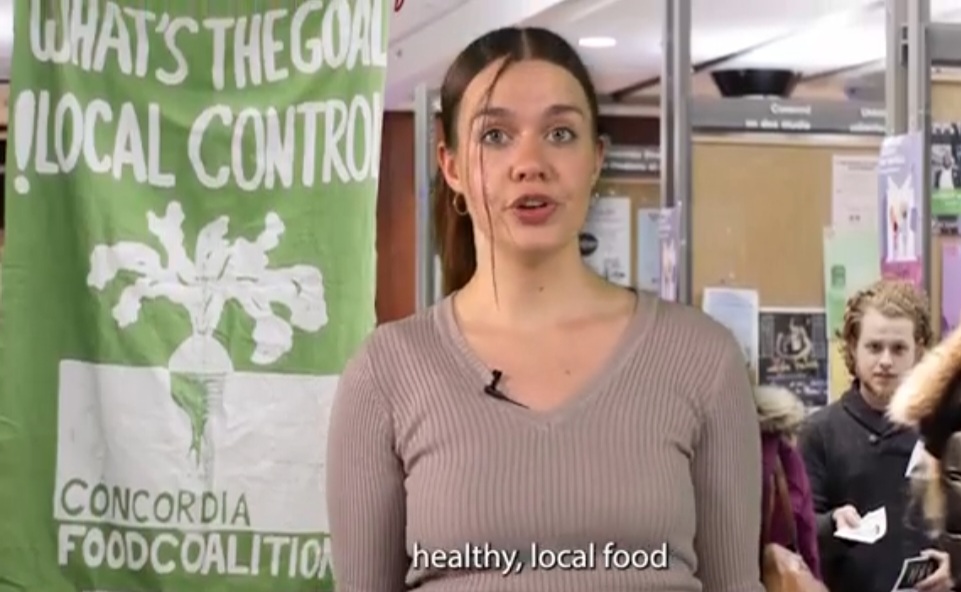Entangled Eating: Art Show on Food Relationships
The Vernissage

This April, The Concordia Food Coalition and the Fine Arts Student Association collaborated to put on the vernissage for Entangled Eating, a multidisciplinary art show centered on food relationships. The event was hosted at the Hive Coop Cafe on the downtown campus of Concordia.
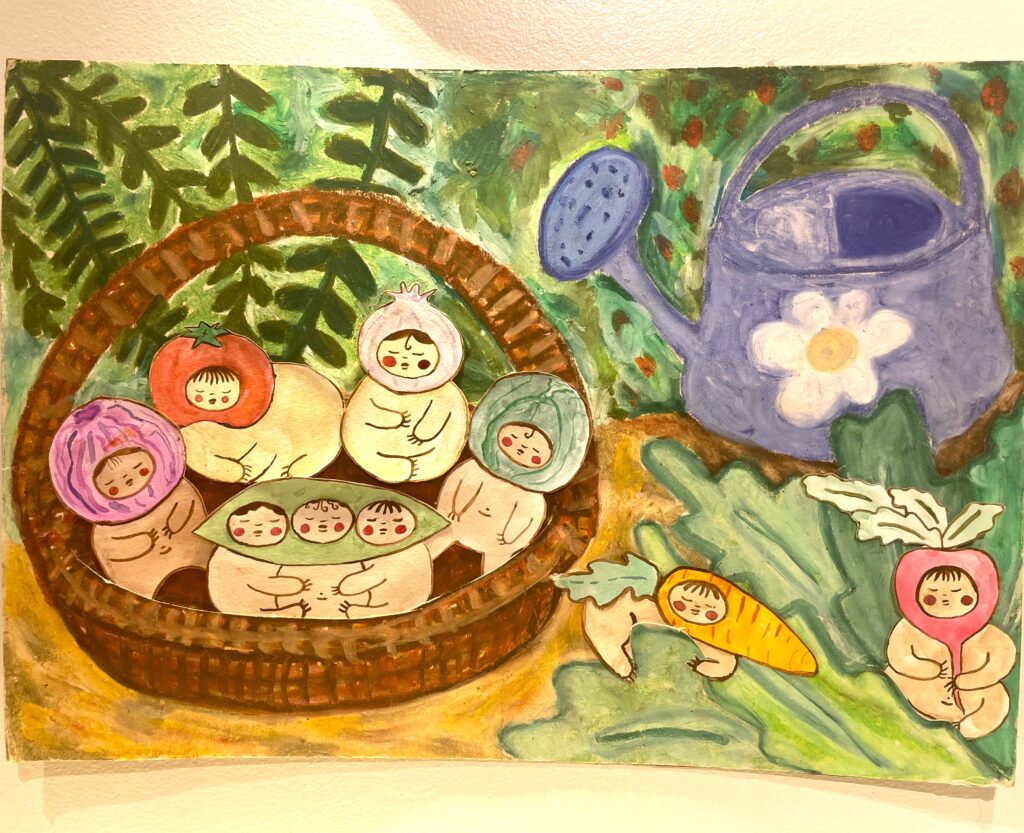
During the vernissage, several visual artists featured in the show spoke about their art and the spiritual connections that they often have with food. Food artists Ruba Al Ghoul and Mika Bosjak told stories about the creative meals they served during the event. The crowd listened with rapt attention to urban farmers from Coop CultivAction and Duff Court Urban Farm as they spoke about their local farming projects.
There are a lot of different ways to get closer to our food system, and it doesn’t have to be a very technical thing, it can be very spiritual; acknowledging where food comes from, thanking the people who produced it, producing it ourselves, making art about it, and sharing with others.
Co-curator Lumina Kitaura had this to say about the show:
“The seed of Entangled Eating is that there are a lot of relationships surrounding food, they include people, soil, animals, plants; everyone is entangled. These relationships might be really beautiful ones or they might be really sickly ones, which begs the question; what kind of relationships do we want with food and with each other?”
Food production doesn’t have to be done on a large scale, on giant farms way off in the countryside. It can be done on rooftops, or in unused plots around the city. We can get creative with urban farming, and campus farm groups like Coop CultivAction have proved this.



The Inspiration: Sustainable, Student and community-run Food Systems
Due to the work that has been taking place at Concordia for the past 30 years by students and community members, we have a relatively strong student and community-run food system, with groups like the Hive, Le Frigo Vert, The People’s Potato, and the Concordia Food Coalition.
Concordia University claims to care about sustainability in its dining services, yet continues to choose Aramark as its meal service provider. An organization that exploits its workers and relies mostly on industrial agriculture cannot be sustainable.
The university continues to reject the proposals the CFC has created and instead has only put effort into making Aramark slightly less bad. They do this by making them source some local food, and by reducing their use of meat, but the fact remains that they’re a multinational corporation that students are forced to buy into.
The team at the Concordia Food Coalition (shout out to Shylah Wolf and Erik Chevrier) have been creating proposals for the last 10 years to create an alternative student and community-run meal service provider called the New Food Enterprise. Keep an eye out for big news and campaigns coming up in the fall semester!
If you want to get involved in food activism at Concordia or plan events to bring people together around healthy local food, reach out to Sheena Swirlz at the Concordia Food Coalition.
A Whole New (Culinary) World: Exploring Concordia’s Food Initiatives
Hi! I`m Hanine, board member at the Concordia Food Coalition and campus food project enthusiast!
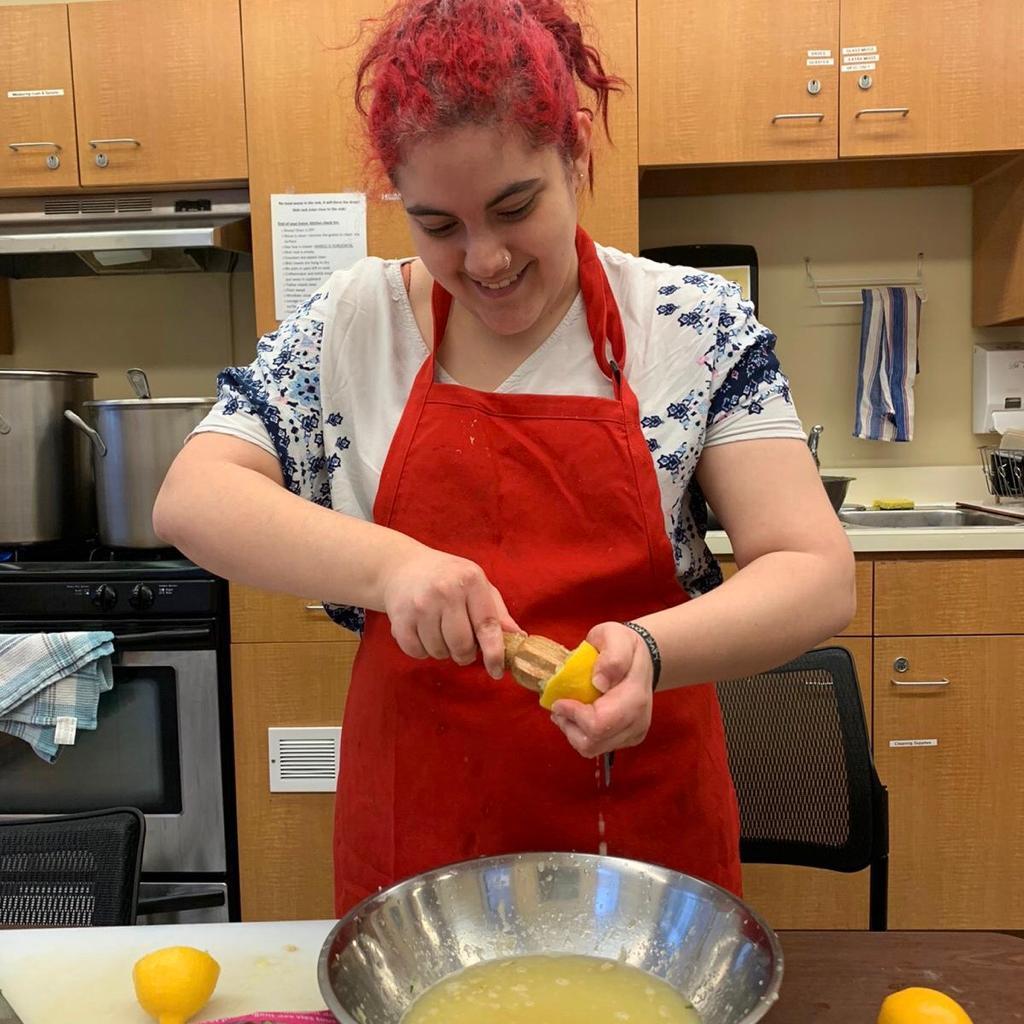
Upon getting my acceptance into a master’s program at Concordia University in 2019, I went out to a celebratory vegan dinner with a friend who had been visiting our home country from Montreal. She gave me a brief account of the revolutionary and culinary history of both campuses, before and after they merged. She also mentioned a place on campus where one can get food that not only is vegan but free of charge too. My interest was piqued: As an international student on a limited budget, I needed to know more about this magical place that served free food.
My friend was talking about the People’s Potato. The People’s Potato, a vegetarian solidarity kitchen which has been operating on campus since 1999, serves 400 members of the community on average every day of service. The People’s Potato also hosts cooking workshops aimed at sustainable zero-waste practices and provides solidarity servings at social justice protests such as the recent pro-Palestine and counter-transphobia ones. I feel the safest on campus when I am in their kitchen.
The Potato isn’t the only place on campus to get good, affordable or free food on campus.
Come with me on a virtual journey exploring Concordia’s food groups…
While teaching in the EV building, we made it a small habit of going to the Concordia farmers’ market after each lecture or tutorial session on Wednesdays, where it was held in the atrium. It served as a good way to know where our ingredients were coming from, all while exposing us to new local crafts. During my second year at Concordia, the farmer’s market ran a bi-weekly food basket program that was at once affordable and helped inspire me with new recipe ideas. More importantly, it introduced me to vegetables I wouldn’t have thought about trying on my own or purchasing from a chain supermarket.
If you were to exit the EV building and walk a few metres, you would stumble upon Le Frigo Vert, a great place for coworking with PWYC tea, affordable coffee and a collection of heartwarming stews, samosas, and empanadas. Make sure to check what they have the day you walk in because there’s always a new surprise bite! At Le Frigo Vert, they also host trans-inclusive, decolonial social justice events covering topics like climate justice, gender and sexuality, and the general inflation of grocery prices. A little goes a long way when it comes to coming together for your community.
Another habit we still talk about among my classmates is hitting The Hive Café Solidarity Co-op in between classes in the Hall building, to grab a coffee, a breakfast burrito and a brownie. It is these moments outside the classroom that we don’t acknowledge often that make up the full picture of our experiences as students, which is why I recommend to everyone to discover these little nooks and crannies and hidden gems as part of their 4-year stay on campus.
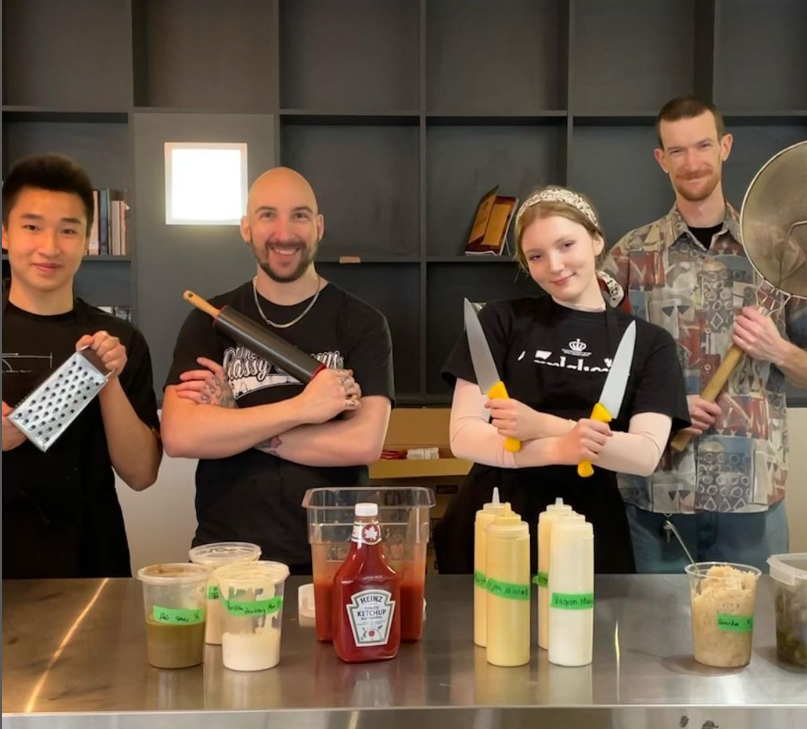
While in line to order at The Hive, one of my favourite things to do is to look at the posters stuck to the pillars to learn about social events, workshops, activities and other opportunities to have free food. Sometimes they also have flyers at the front for good resources like ‘what to do and say if you get arrested’. This has to be my favourite thing about food initiatives on campus: they aren’t limited to serving cheap, affordable, or free meals and snacks. Several, if not all of them, are involved, one way or another, in political causes that affect us all. If that wasn’t enough to reel you in, The Hive also has a free lunch program at the Loyola campus, and they also introduced a free breakfast program to supplement it this semester.
The flyers by the cashier also introduced me to Mother Hubbard’s Cupboard’s 2-dollar dinners. Mother Hubbard’s Cupboard ran on Monday evenings during my very short time volunteering there and served a full-course meal that consisted of a salad, a main and a side of rice or other grains. On occasion, we had dessert in the form of orange quarters or other fruits.
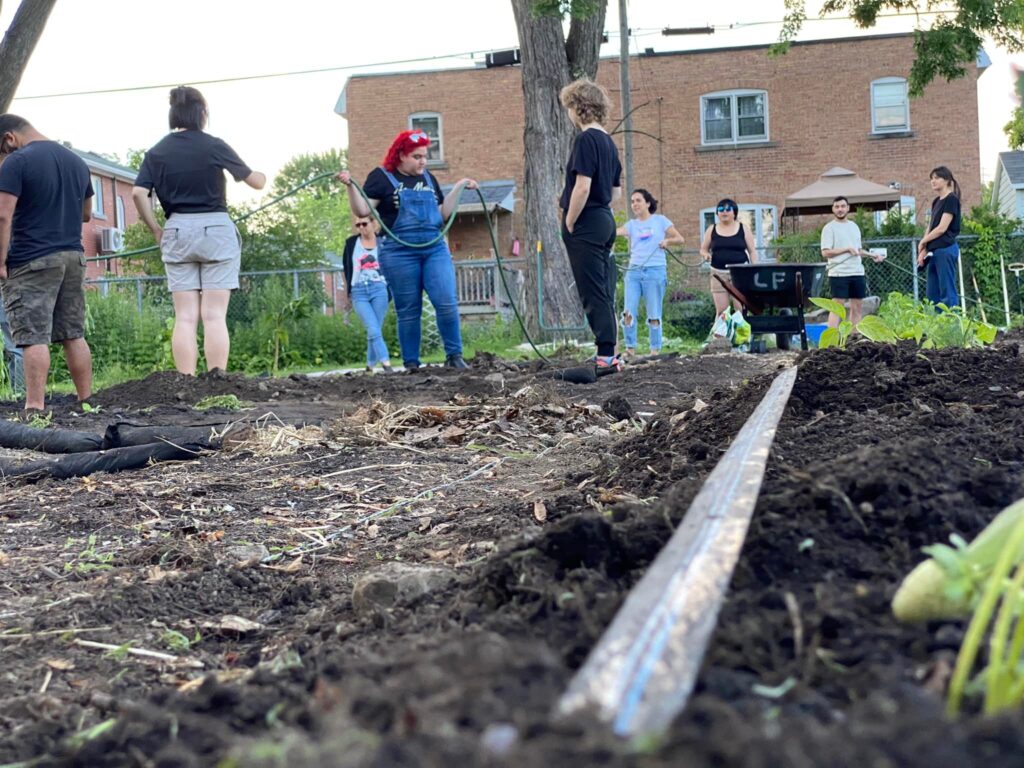
But that’s not all there is to it: so many more food initiatives have popped up on both campuses since I came to Concordia. Coop Cultivaction is celebrating its third year in the garden at Loyola this summer, sharing the space with other familiar initiatives like the People’s Potato Collective Garden and Mind.Heart.Mouth. Last summer, these three were joined by the Sankofa Farming Cooperative and Hamidou Horticulture.
Coop Cultivaction’s Urban Agriculture course helped me, as a consumer, understand the way vegetable and fruit production works. I was able to grow things after years of saying ‘I wish I could have a green thumb’ and all it took was to do it in the company of people who are there to encourage you instead of exploiting you. This is especially important these days with the inflated prices and the illusion of shortages across supermarket chains. We don’t have to be at their mercy when clearly we, and other people, are producing tons of food on campus.
Check out the map of the campus grassroots food system!
Join the FREE FOOD WhatsApp group chat!
Introducing the New Food Enterprise (NFE): A Catalyst for Transformative Campus and Community Foodscapes
Planting Seeds of Success: Cultivating the New Food Enterprise (NFE)
The New Food Enterprise (NFE) is the working name for a new innovative, community-driven solution to replace the multinational corporation that currently runs the cafeterias at the SGW and Loyola campuses.
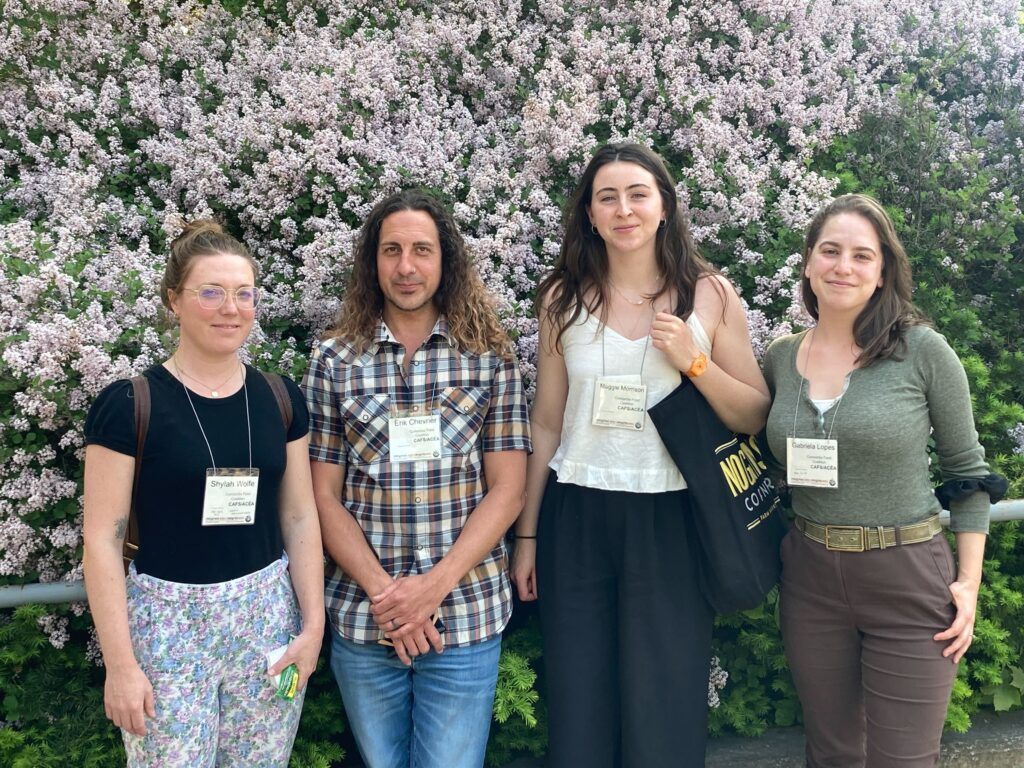
The NFE is a collaborative effort between the Concordia Food Coalition (CFC) and Diversity Food Services, with plenty of support from the Concordia Student Union (CSU), SEIZE and some campus food groups.
After decades of pushing the Concordia institution to divest from exploitative, profit-driven multinational corporations in favour of a model driven by and for the Concordia community, we have resolved to do it ourselves. We are creating the NFE to bring the principles of environmental sustainability, social justice, cultural inclusivity and community-embedded economic democracy to the Concordia cafeterias at Loyola and SGW campuses. The NFE will be a social enterprise, jointly owned and operated by the key stakeholders of the very services the organization provides – in other words, transparency and accountability to students will be baked right in.
Serving Change: The Importance of Developing the NFE
The global food system is not socially, environmentally and economically sustainable, and the pressure is on to drastically change the way we do things in order to stop climate change. Universities and other institutions play a pivotal role in developing more ecologically sustainable, equitable and just foodscapes because they procure and serve a lot of food to concentrated, local populations.
But rather than implementing foodservice models that address global food crises, most Canadian post-secondary institutions outsource food services entirely. Administrators hire large multinational corporations that exacerbate these issues. At Concordia, the “profit-loss” model is used wherein the University gives certain spaces and facilities (cafeterias, retail outlets) to an external company, in exchange for a commission off whatever those companies sell. Companies like Aramark, Chartwells-Compass, and Sodexo[1] (referred to as “the big three”) find these contracts attractive because they gain exclusive rights to consumers like residence students (who must buy meal plans), so they have guaranteed sales no matter what.
Critics have long raised substantial concerns about Aramark, Chartwells-Compass, and Sodexo. The big three maximize profits by externalizing environmental and social costs, exploiting labour, and purchasing inexpensive food with significant environmental footprints. They have a documented history of employment discrimination, false claims, wage issues, labour relations problems, employment screening concerns, privacy breaches, and workplace health and safety abuses[2].
We’re building the NFE to narrow the margin between the unsustainable status quo and viable alternatives to sustainable campus food service delivery for institutions. The community-embedded model (gleaned from Diversity Food Services) has shown that collaborative efforts between administrators, faculty, students, and neighbouring communities can sustainably improve university food systems.
A Taste of Transformation: A Fruitful Analysis of the NFE’s Journey
Over the past three decades, Concordia University’s students, faculty, and broader community have developed a robust network of campus-community food organizations that practice food production, processing, distribution, and waste management. In the same timeframe, groups such as the People’s Potato, the Concordia Student Union, and the CFC have lobbied and tried to negotiate with the university administration to self-operate food services on campus, hire a social enterprise or develop a new cooperative/non-profit to run the campus foodservices, because services offered by the big three have historically been subpar both in quality and sustainability metrics. This kind of student pressure and pioneering has thus far led Concordia to begin making significant commitments to environmental and social sustainability – including developing the Sustainability Action Plan and pledging to divest from fossil fuels.
Despite all this progress and commitment, Concordia renewed it’s contract with Aramark in 2022; a four-year contract with the possibility of a 2-year extension. As a result of our negotiations, we did make some gains though; Concordia administrators agreed to explore the idea of co-developing or allowing a new social economy enterprise to bid on the next food service contract.
Over the past two years, the CFC, CSU, and Diversity Food Services have been working behind the scenes to research and test the financial and logistical feasibility of the project, and consult Concordia administrators to ensure the NFE meets all the criteria for the next food service contract.
On February 15th, 2024, we presented the six-year financial plan to the Concordia administration in hopes of collaborating as close partners to establish the NFE. While we were hopeful, we were not unrealistic – years of negotiation about Concordia’s foodservices has taught us that administrators have a heavy skepticism about the viability and reliability of Concordia campus-community food organizations – despite some being in operation for over thirty years. Narratives of “risk aversion” and “lack of demonstrable experience or proof of concept” are often used to shut down new proposals.
We hope that current administrators recognize the potential benefits of embracing calculated risks for sustainable outcomes. Through meticulous planning and financial forecasting, the NFE has the potential not only to be viable but to flourish and to become a true leader in high quality, sustainable foodservices, like Diversity Food Services has done.
Feeding the Future: Uniting Students as the Chefs of Change
Students are the main drivers of social change and have the power to make the NFE a reality. Concordia has a rich history of student activism that has pioneered all the meaningful progress toward sustainable, accessible, edible food on campus. To do so, students must make their voices heard and remain unified in their demands.
You can learn more about the campus-community food system and your power to change it at our Building Food Revolutions seminar with SEIZE on March 14th at 6pm in the Hall building(room 544). You can get involved by coming to our Dinner and Docs Night on April 10th at the MultiFaith at the Multifaith Spirituality Centre to discuss issues with Aramark and how we can successfully incubate the NFE.
There will also be many other opportunities to get involved in the future!
Follow the CFC NFE webpage for more updates on how to get involved or lean more about the NFE.
References
Bohunicky, M., Desmarais, A. A., & Entz, M. (2019). Self-Operated vs. Corporate Contract: A Study of Food Procurement at Two Universities in Manitoba. Canadian Food Studies, 6(1), 43-74.
Chevrier, E. (2022) Building Food Sovereign Campuses: A Case Study of the Campus-Community Food Groups at Concordia University. Unpublished Doctoral Thesis.
Government of Western Australia. (2021, November 1). Melaleuca prison returns to public sector management. Retrieved from Government of Western Australia: https://www.mediastatements.wa.gov.au/Pages/McGowan/2020/04/Melaleuca-prison- returns-to-public-sector-management.aspx
Martin, S. J., & Andrée, P. (2012). The “Buy Local” Challenge to Institutional Foodservice Corporations in Historical Context. Journal of Agriculture, Food Systems, an Community Development, 2(3), 161-175.
5 Great Reasons to Volunteer with Food Groups at Concordia
Whether you are new to campus or have been here a while, there are so many groups and organizations to get involved with at Concordia. Volunteering is a great opportunity for self-improvement while making a positive impact on the lives of others.
There are many student-led food organizations here that work to fight food insecurity and improve access to healthy food on campus. You can choose from cooking with campus kitchen groups, learning to grow food in one of the many ecological campus gardens, or getting involved with food waste initiatives making an impact at Concordia.
Why volunteer your time? Here are a few great reasons to inspire!
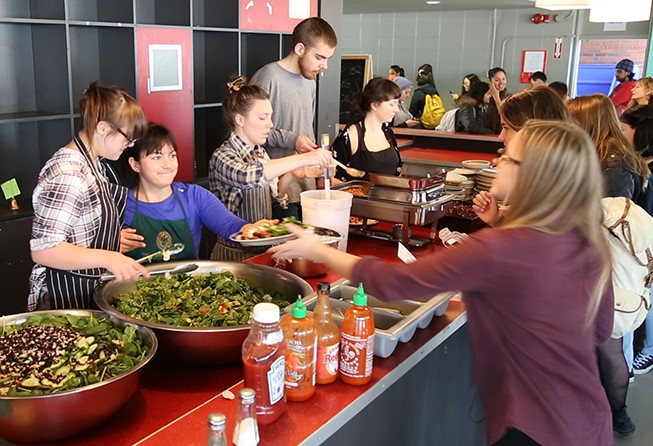
1. Get food for FREE!
With food prices on the rise, buying groceries and dining out on a student budget can be a challenge! People’s Potato and the Hive Free Breakfast and Lunch volunteers can grab a free meal during their shifts.
Sometimes during campus garden volunteer sessions, helpers can pick up fresh and ecologically-grown produce at the end of the work day.
When searching for volunteer opportunities on campus, it’s crucial to discover organizations that resonate with your principles and contribute your efforts to causes that ignite your passion.
If you share our commitment to combating food insecurity on campus we encourage to to get involved and get active and engage during your time at Concordia.
2. Meet like-minded people on campus
Imagine a super-friendly workplace filled with volunteers passionate about access to good food – that’s where you get to hang out with awesome folks who share your interests and vibes. When you’re on the same team every time, you’re basically building a new network. You can look forward to your weekly volunteer shift because you get to chill with your crew! It’s like a mental vacation from classes and a breath of fresh air on those study-heavy days.
3. Help address food insecurity on campus
These not-for-profit, volunteer-focused organizations share a common goal of increasing food security by providing affordable, accessible, and nutritious food to as many people as possible. Le Frigo Vert sells affordable grocery essentials, herbs, and campus-grown products.
The Concordia Farmers Market gives students access to campus-grown produce local food preserves and more and distributes Market dollars to food-insecure students through tabling events and student services.
While the Farmers market and Frigo do not offer weekly sessions, you can reach out for details on how to help with events, campaigns and more.
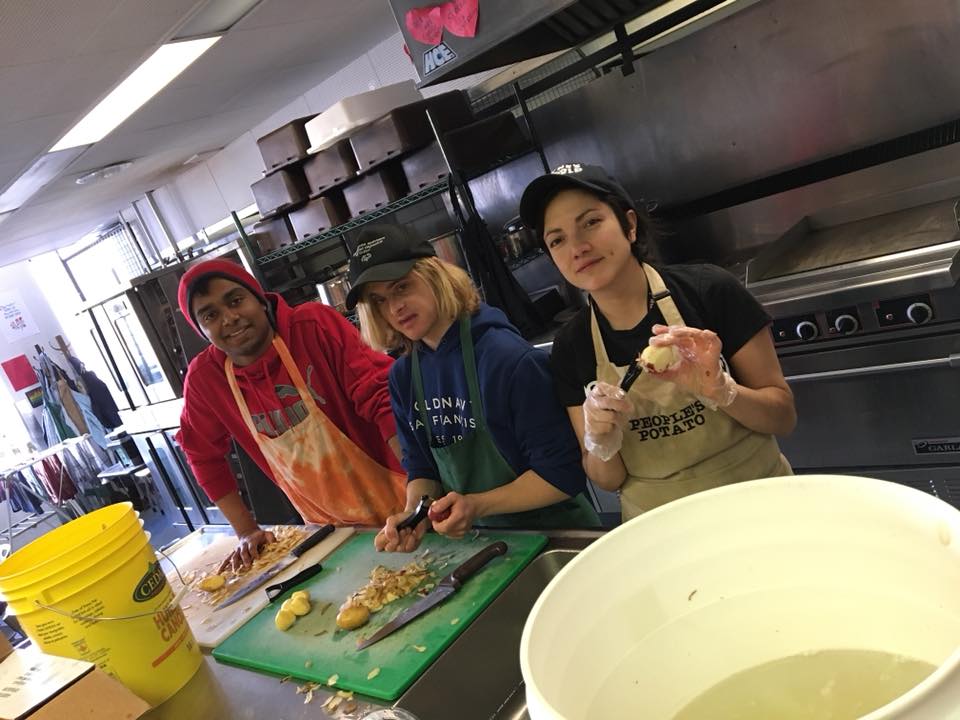
4. Learn how to prepare nutritious meals with local ingredients
Volunteering with an organization like Hive Free Breakfast and Lunch is a great way to develop food safety knowledge, and knife and culinary skills.
You can learn new recipes by cooking together with the Multifaith monthly community dinners, Palette to Plate events, and Dinner and Docs Nights. If you’re just starting in the kitchen, this is your chance to whip up some awesome cooking and baking skills from scratch! But hey, if you’re already a kitchen wizard, you can step up and become the master chef of your team. Boosting your food knowledge now will pay off down the road. You’ll be making smarter, budget-friendly, and eco-conscious food choices like a pro!
5. We all have to work in this capitalist world” so why not find a gig at a place that tries to help others?
We get it – balancing school and building up your resume can be tough. But guess what? These volunteer gigs are your golden ticket to gaining real-life experience in a high-energy food scene. You’ll be whipping up delicious plant-based dishes and feeding the campus!
Plus, here’s the best part – these organizations are super chill about your schedule. You can volunteer as little as 2 hours a week and pick shifts that fit your vibe. No need for prior foodie experience either! You’ll learn valuable skills in a laid-back environment.
Working on a team will boost your customer service and talking skills, and your resume will get a major upgrade. These experiences show you’re hands-on, a team player, and learning how to be of service to others.
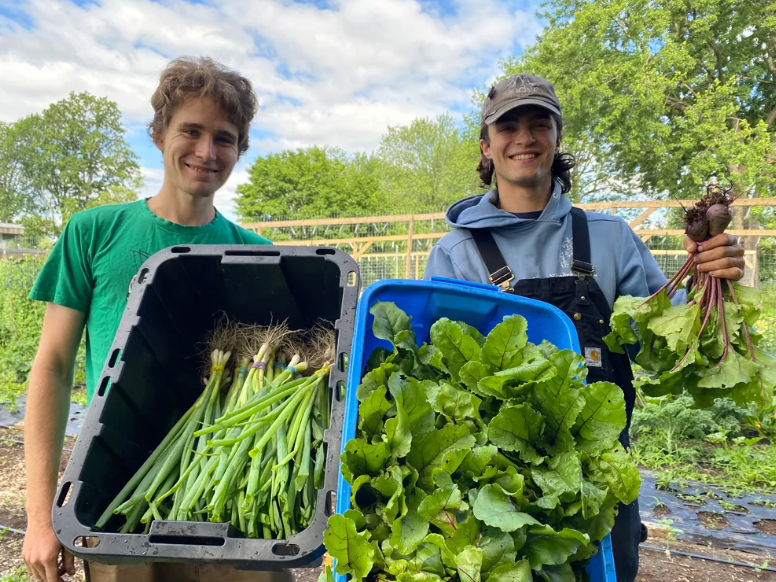
Want to get growing?
Learn more about campus garden volunteer sessions here.
Want to get cooking?
Volunteer sessions run weekly with:
Want to learn about food waste reduction?
Learn more about campus food groups, events, campaigns and more, on our Concordia Food Community Page
Top 5 Food Spotlight Books

Looking for a good read? Check out one of these inspiring books or articles.
Have a suggestion? Let us know!
Cultivating Food Sovereign Campuses: Feeding the Planet’s Future

Today’s students face many serious food challenges, such as declining food security and the increasing threats of climate change (1).
The active involvement of university students, faculty, and surrounding communities is pivotal in driving positive change. By shifting focus from traditional sustainability paradigms to a food sovereignty perspective, this piece explores how universities can transform campus and community food systems.
The Rotten Truth: Unsustainability in Our Food System
The global food system is not environmentally, socially, or economically sustainable. Industrial
agricultural practices are pushing the planet beyond its ecological limits, encroaching upon, and
surpassing, critical planetary boundaries; especially those pertaining to deforestation,
biodiversity loss, freshwater use, greenhouse gas emissions, as well as the overproduction of
phosphorus and nitrogen (2). Simultaneously, this system perpetuates social injustices, rooted in a
history of exploitation, from colonial-era slavery to modern-day migrant labor abuse (3). In the
name of modern agriculture, Indigenous communities continue to endure the dispossession of
their lands and traditional food practices. These social injustices are paradoxically justified in the
name of global food security, a concept undermined by the glaring contradiction of ample food
supply coexisting with widespread hunger. The global food supply can presently feed over ten
billion people, yet over eight hundred million people are starving across the world (4). Moreover,
the economic underpinning of the food system is fraught with inconsistencies. Farmers struggle
to make ends meet as they sink deeper into debt to remain competitive, propping up a system that
sets food prices below the cost of reproducing farm laborers (5). Fortunately, university campuses
are fertile grounds for developing transformative campus-community food systems due to their
abundant resources, capacity for knowledge-building, and inherent civic duty to create positive
value in the world.
Redefining the Recipe: The Shift from Industrial Multinationals to Campus-Community Food Networks
The time is ripe to move away from multinational food service corporations and embrace a
transformative approach rooted in social and ecological economies. In Canada, Aramark,
Chartwells-Compass, and Sodexo, the most contracted university food service providers (6), employ
dubious practices such as exploiting prison labor, competing aggressively with non-profits,
undermining unions, and compromising food quality to save money, raising ethical and quality
concerns (7). Campus-community food organizations are offering alternative transformative
approaches rooted in social and ecological community values.
Since the 1990s, numerous campus-community food organizations have emerged, aiming to
challenge multinational food service corporations, improve campus food options, and foster food
sovereignty, security, and justice. For instance, the Eat Your Peel Collective, later renamed Le
Frigo Vert in 1993, set the stage for ethical food distribution at Concordia, evolving into a space with a strong emphasis on anti-capitalism, anti-colonialism, and community support. Similarly,
the People’s Potato, established five years later, operates as a vegan soup kitchen, providing meals
to hundreds of students annually, for a little over $10 per year, per student. Campus-community
organizations offer a community-centric, democratic approach with shared means of production
(and surplus) and a focus on social and ecological well-being. While they are not without
imperfections, they represent a more fitting choice for transforming community food systems.
Please see the chart below for an overview of the campus-community food system at Concordia
University.
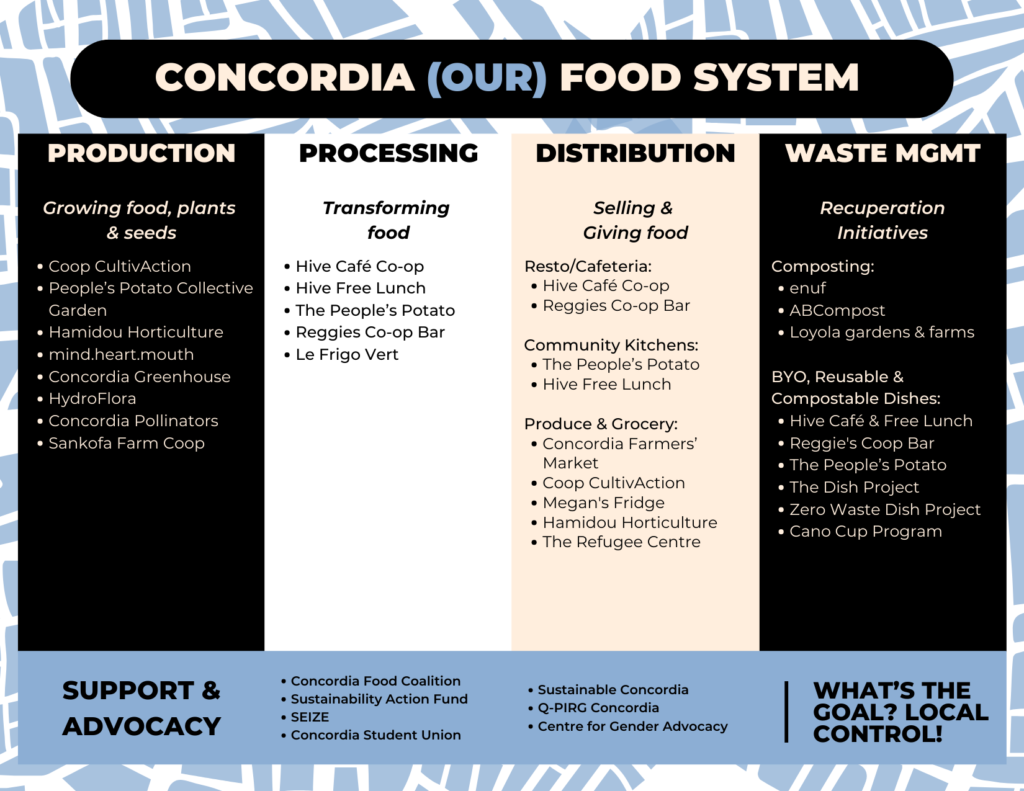
Sowing Seeds of Change: From Sustainable Campus Food Services to Food Sovereign Campuses
At the 1996 World Food Summit, La Via Campesina emphasized the critical role of “food
sovereignty as a precondition for food security”(8). In a similar manner, I argue that establishing a
food-sovereign campus is essential for achieving genuinely sustainable university food services.
The term “sustainability” is complex and often misused, sometimes even serving as a cover for
harmful practices through greenwashing (9). Furthermore, the multifaceted nature of sustainability,
including “The Triple Bottom Line” concept, often overlooks the hierarchical significance of the
biosphere, society, and the economy. In this hierarchy, the biosphere takes precedence, as the
economy relies on social systems, and social systems, in turn, rely on the biosphere (10). Food
sovereignty is also a complex, multi-dimensional concept. Despite diverse definitions, it
consistently promotes transformative, strong sustainability, distinguishing itself from
conventional practices prioritizing economic growth and corporate interests over social systems
and the environment. It signifies an ongoing movement, democratic practice, and declarations of
rights, emphasizing people’s control over their food economy. It also stands as the most radical
approach in comparative food regime models, challenging corporate-led, neoliberal, industrial
agriculture.
Feeding Change: Growing Food Sovereignty on Campus
Food sovereignty offers an empowering paradigm for university communities to reshape their
food systems across at least eight crucial dimensions (please see chart below). It veers away from
corporate profit-driven models, favoring an inclusive and holistic approach that empowers
students, faculty, and the wider community. In contrast, the weak sustainability approach often
falls short of transformative change, as it fails to address the root causes of the problem. Food
sovereignty adopts a community-driven model where diverse stakeholders collaborate to
revolutionize both campus and local food systems into community-centered, truly sustainable,
and just entities. It challenges the traditional corporate approach, championing the right of people
to control their food economy.
Creating food sovereign campuses will not come without challenges. Identifying the true
representatives of “the people” within a university context can be intricate. At present, the
university administration holds the ultimate authority over food services. Faculty and students can
drive transformative change through activism, community-based learning, and participatory-
action research, while community members can contribute to local food chains and social justice.
In this approach, the sovereignty of the campus food system is collectively defined, measured,
and continually enhanced. It represents an ongoing movement, a democratic process perpetually
under negotiation, and a potent tool for the campus community to co-create their own foodscape.
Rather than focusing on mandatory meal plans that primarily benefit multinational corporations,
food-sovereign campuses celebrate diverse economic practices. This approach, more radical than
conventional sustainability models, offers a path to achieve comprehensive and meaningful
sustainability (rooted in ecological and social justice) on campuses. Constructing food-sovereign
campuses entail engaging stakeholders in meaningful dialogues, enabling them to shape a food
system tailored to their unique campus and community requirements. It’s about nurturing a sense
of ownership and control over the foodscape, transcending the constraints of traditional
sustainability models, and embracing a more transformative and inclusive vision for the future.
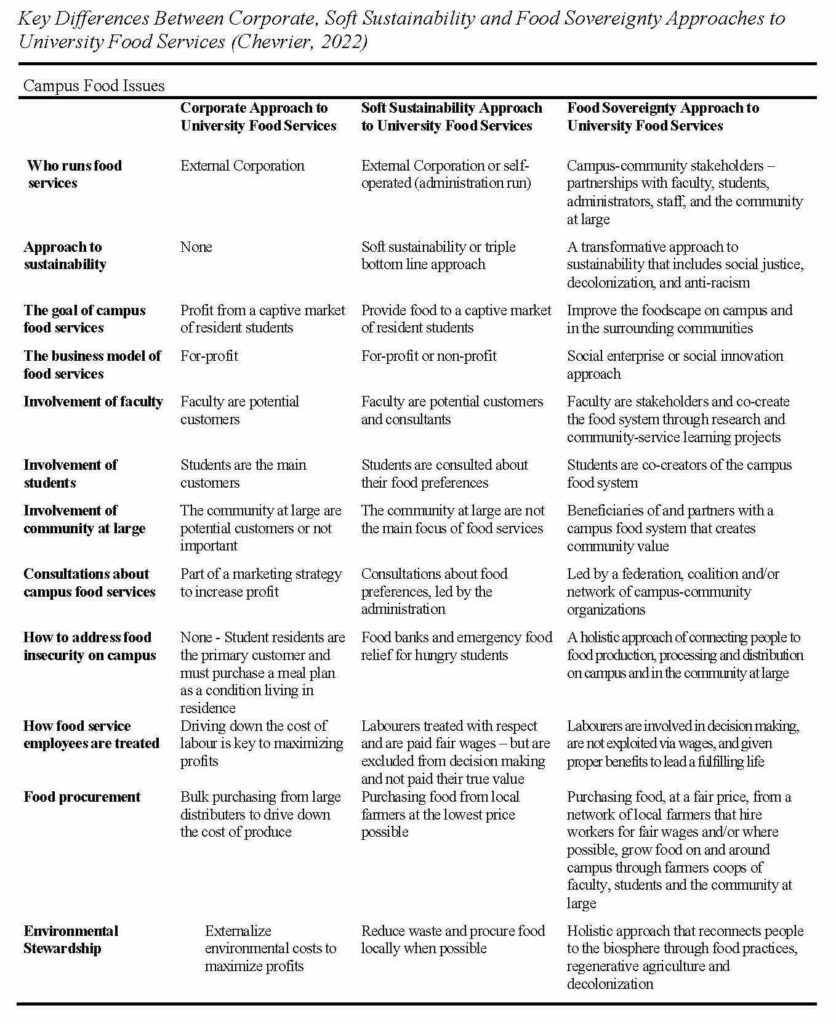
Wrapping it Up: Embracing Food Sovereign Campuses
The global food system faces significant challenges on multiple fronts – environmentally,
socially, and economically. The shift from multinational food service corporations to food-sovereign campuses is crucial for achieving genuinely sustainable university food services. Food sovereignty offers a more holistic and just alternative to the current system, emphasizing the
right of people to control their food economy. Building food-sovereign campuses presents an
opportunity to transform campus and community foodscapes through a process that involves
dialogue and engagement with stakeholders, empowering them to shape a food system that aligns
with their dietary needs and social values.
The path to an ecological, just, and transformative food system begins with embracing the
concept of food sovereignty, both on university campuses and beyond. This paradigm shift
represents a powerful tool for shaping a more equitable and environmentally responsible future
for our global food system. We should think beyond sustainability and build food sovereign
campuses.
If you want a more in-depth analysis of this article, please read my doctoral thesis, Building
Food Sovereign Campuses: A Case Study of the Campus-Community Food Groups at Concordia
University.
[1] Naheed, S. (2023) An overview of the influence of climate change on food security and human health, Archives of Food and Nutritional Science, 7: 001-011.
[2] UNEP (2016) Food Systems and Natural Resources. A Report of the Working Group on Food Systems of the International Resource Panel. Westhoek, H, Ingram J., Van Berkum, S., Ozay, L., and Hajer M.
[3] Ayres, S. (2020) Pandemic in the fields: The harsh realities temporary foreign workers face in Canada, CTV Documentary
[4] Holt-Giménez, Eric & Shattuck, Annie & Altieri, Miguel & Herren, Hans & Gliessman, Steve. (2012). We Already Grow Enough Food for 10 Billion People … and Still Can’t End Hunger. Journal of Sustainable Agriculture – J SUSTAINABLE AGR. 36. 595-598. 10.1080/10440046.2012.695331.
[5] Holt-Giménez, E. (2017). A Foodie’s Guide to Capitalism: Understanding the Political Economy of What We Eat. Monthly Review Press.
[6] Chevrier, E. (2022) Building Food Sovereign Campuses: A Case Study of the Campus-Community Food Groups at Concordia University, Ph.D. Thesis.
[7] Martin, S. J., & Andrée, P. (2012). The “Buy Local” Challenge to Institutional Foodservice Corporations in Historical Context. Journal of Agriculture, Food Systems, an Community Development, 2(3), 161-175.
[8] Patel, R. (2009). Food sovereignty. The Journal of Peasant Studies, 36(6), 663-706.
[9] Sumner, J. (2012). Conceptualizing Sustainable Food Systems. In M. Koc, J. Sumner, & A. Winson, Conceptualizing Sustainable Food Systems (pp. 320-331). Critical Studies Perspectives in Food Studies: Oxford University Press.
[10] Shiva, V. (2005). Earth Democracy: Justice, Sustainability and Peace. Berkley, California: North Atlantic Books. [1] Patel, R. (2009). Food sovereignty. The Journal of Peasant Studies, 36(6), 663-706.
Thirty Years of Student Food Organizing
This year marks a big anniversary – a whopping 30 years ago, the first food fee-levy (shout out to Le Frigo Vert!) kicked off and ushered in a new era for food at Concordia. 🎉

To celebrate, we’re diving into the vibrant and remarkable history of student food organizing on our campus and bringing it to life for you both in the digital and real world!
Read on to learn a brief history and check out the Food Revolution Game open to play all this month to win free food at your favourite campus spots!
There were some important and impressive moments before the ’90s, but these past three decades have seen some seriously game-changing moments that totally shifted how we look at food around here. From pushing for eco-friendly practices to making sure everyone feels included and can access good food, we’ve come a long way.
Come geek out with us on the inspiring tales that paved the way for a better dining scene at Concordia.
A Taste of Change: Fighting for Food Justice
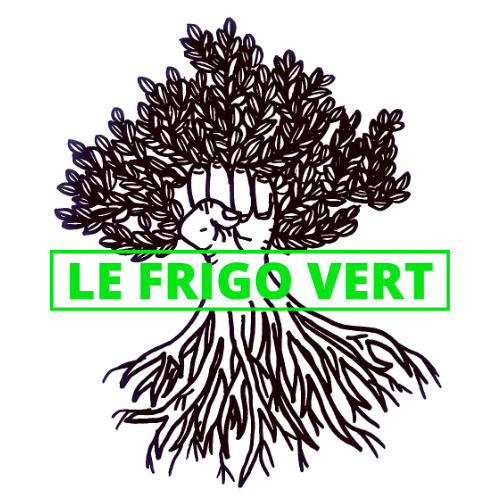
In the early 1990s, some fired-up students had a vision: to revolutionize the campus food scene. They were sick and tired of the meagre choices, lack of healthy alternatives and how the big corporate food service provider held all the control of these options on campus. With the help of QPIRG, they formed the first food fee-levy: “Eat Your Peel” Collective (you now them best as Le Frigo Vert), where “ethical food” and anti-capitalist organizing took centre stage. Not too long after, the Multi Faith Spirituality Centre opened Mother Hubbard’s Cupboard where students could learn to cook and get a free vegetarian meal. Meanwhile, the CSU was schooling students on anti-imperialism in food.
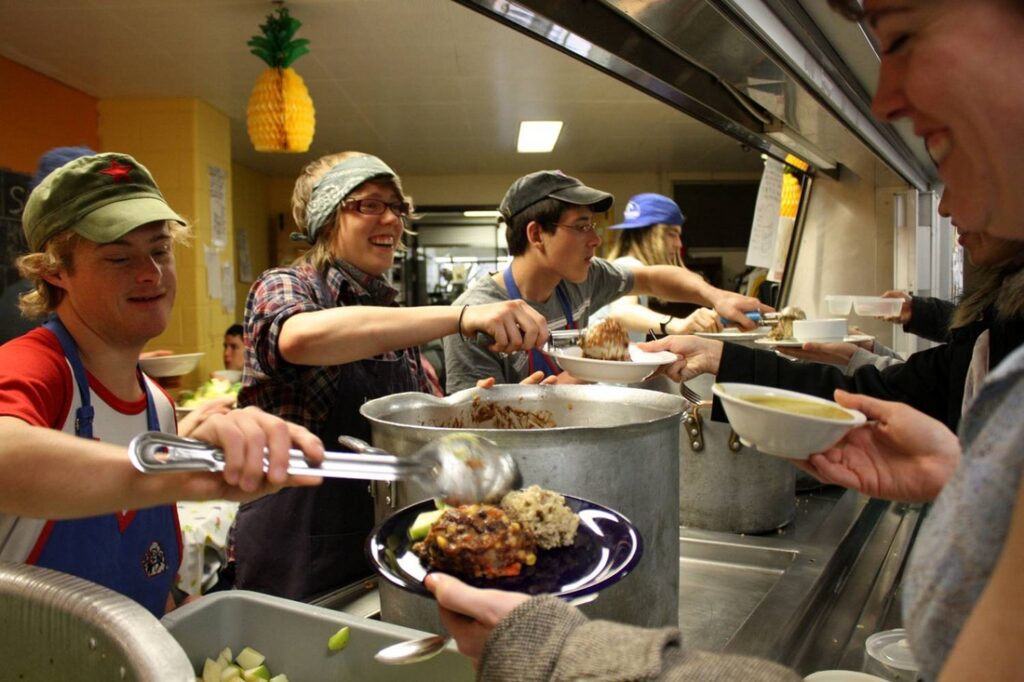
These groundbreaking initiatives set the tone for future endeavours and ignited a spark within the student body. By the late ’90s the People’s Potato, Le Frigo Vert and Reggie’s Bar teamed up to form the Concordia Food Mosaic, working together to feed Concordia students as well as feed conversation, community, political organizing and rad-activism.
Sustainability Takes Root: Introducing Organic and Fair Trade Options
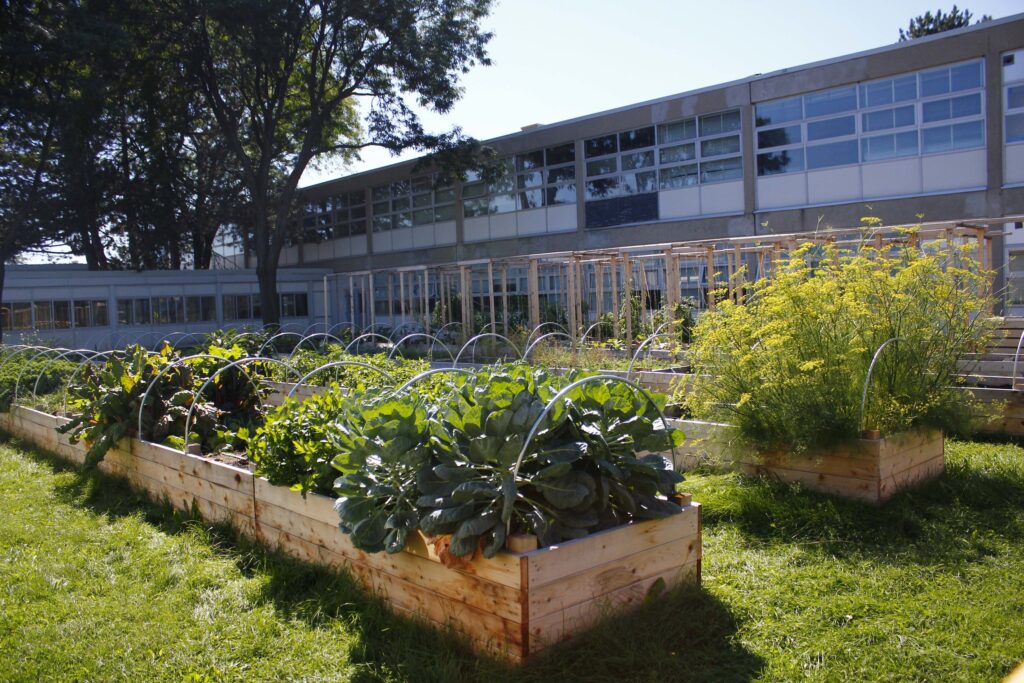
While Frigo and the Potato were becoming campus staples, the demand for sustainability in food practices was on the rise. Concordia’s student-led food movement spearheaded this charge in the 2000s, giving birth to Sustainable Concordia (SC) and Sustainability Action Fund (SAF). SC initiated impactful projects like the R4 Dish Project to reduce single-use dishes and the rejuvenation of the Concordia Greenhouse as a community education hub. Since cropping up, SAF funded virtually every sustainable food initiative in existence at Concordia today. We also saw the rise of urban agriculture champs like City Farm School and the People’s Potato Garden at Loyola, making our campus greener and our food fresher.
These milestones weren’t just about changing our food game; they showcased how coming together as a community can spark some seriously awesome change.
Breaking Barriers: Creating a Vibrant Parallel System
As the new decade unfolded, a palpable political energy electrified every corner of student activism in Quebec, fueled by the Maple Spring movement. After the wave of impactful protests in 2012, passionate activists reoriented their focus towards democratizing Concordia’s food system. Inspired by the ethos and values of the ’90s, they worked to expand the alternative campus food system with social economy models.
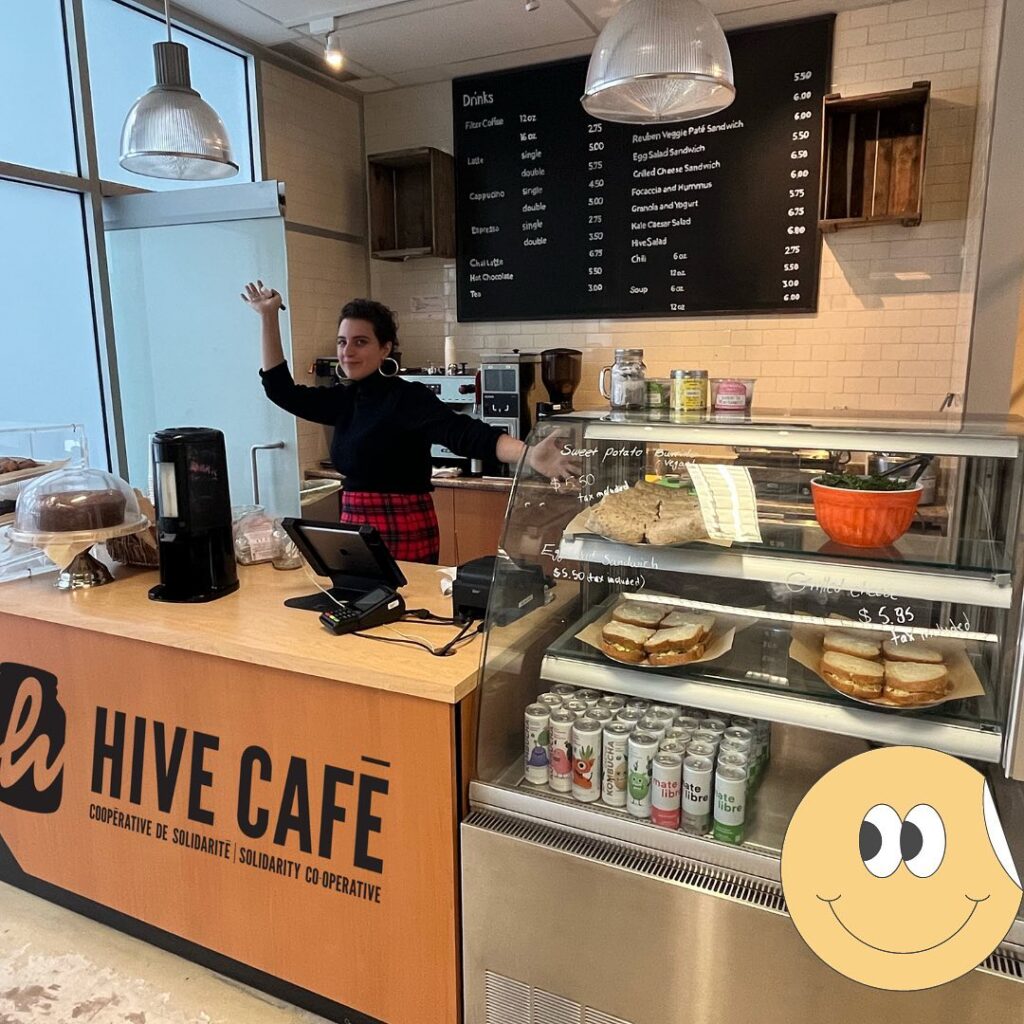
By this point, students spent 30 years and millions of dollars crafting an entire parallel food system to the corporate food providers, establishing a network of food production, processing, distribution and waste services rooted in community, solidarity, justice, democracy, and environmental sustainability. And voilà! This journey birthed remarkable transformations: the Hive Cafe Cooperative, Reggie’s Bar transformed from a for-profit corporation into a solidarity cooperative, the inception of Enuf as a B-corporation, and the creation of yours truly, the nonprofit Concordia Food Coalition, here to support them all.
In this whirlwind tour through Concordia University’s food activism history, we’ve witnessed a spectacular saga of change and dedication. Starting with a simmering discontent and igniting a flame that has only grown brighter with time. These milestones have left such an impact on our community! This journey is a great example to the incredible power of coming together. Our collective efforts have the power to transform not only our dining experience but also the world around us.
As we toast to this exciting history, let’s set our sights on new recipes for revolution. The future of food organizing at Concordia promises to be just as exciting, fueled by the same passion and collaboration that has driven us so far. Let us continue to build upon the legacy of those who came before us, as we strive to create an even more sustainable, inclusive, and delicious future for all.
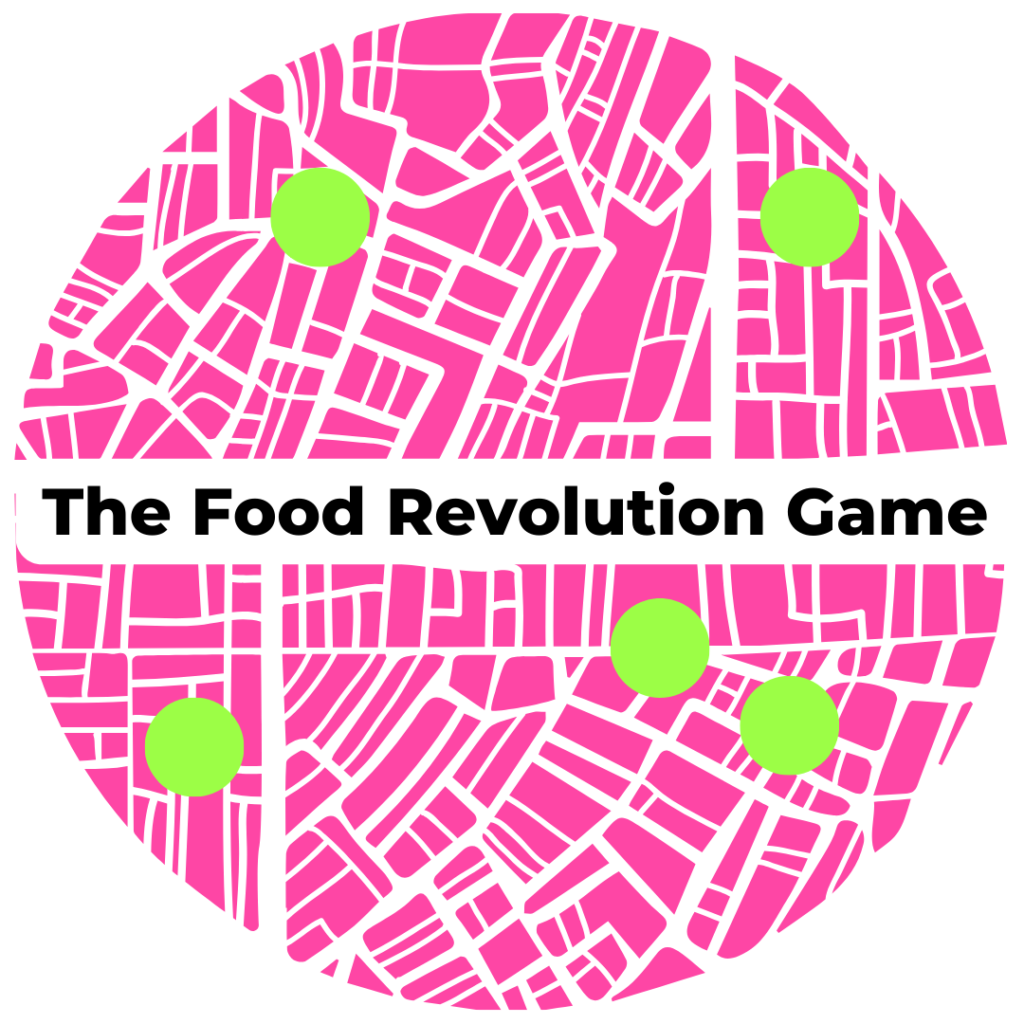
To learn more about each inspiring food project, don`t miss playing The Food Revolution Game. It’s hosted by the team at the Concordia Food Coalition, we’ve created an interactive map – and educational experience! – designed to engage students with the history and significance of the food movement at Concordia University.
You can play our game by visiting a selection of checkpoints and art landmarks on Concordia campus that reference milestones from the Concordia Food Movement.
These checkpoints serve as guideposts for a self-directed walking food tour, where players will uncover stories, facts, and further readings about the food movement through QR codes linked to this interactive map.
Thanks to Erik Chevrier for the food history excerpts provided for this article.
Top 5 Food Instagram Accounts to Follow!

We have a new monthly feature!
TOP 5 Lists to check out with themes of agriculture, food access, coops and food communities.
This month we are featuring our Top 5 Food Instagram Accounts to Follow
Looking for some good content? Check out one of these inspiring accounts!

- https://www.instagram.com/blackforager/ @blackforager
- https://www.instagram.com/sundanceharvest/ @sundanceharvest
- https://www.instagram.com/communityfoodcentresca/ @communityfoodcentresca
- https://www.instagram.com/afrovegansociety/ @afrovegansociety
- https://www.instagram.com/farmersfootprint/ @farmersfootprint
Have a suggestion for a food instagram to follow? Let us know!
Earth, dirt, soil—and other scary garden encounters
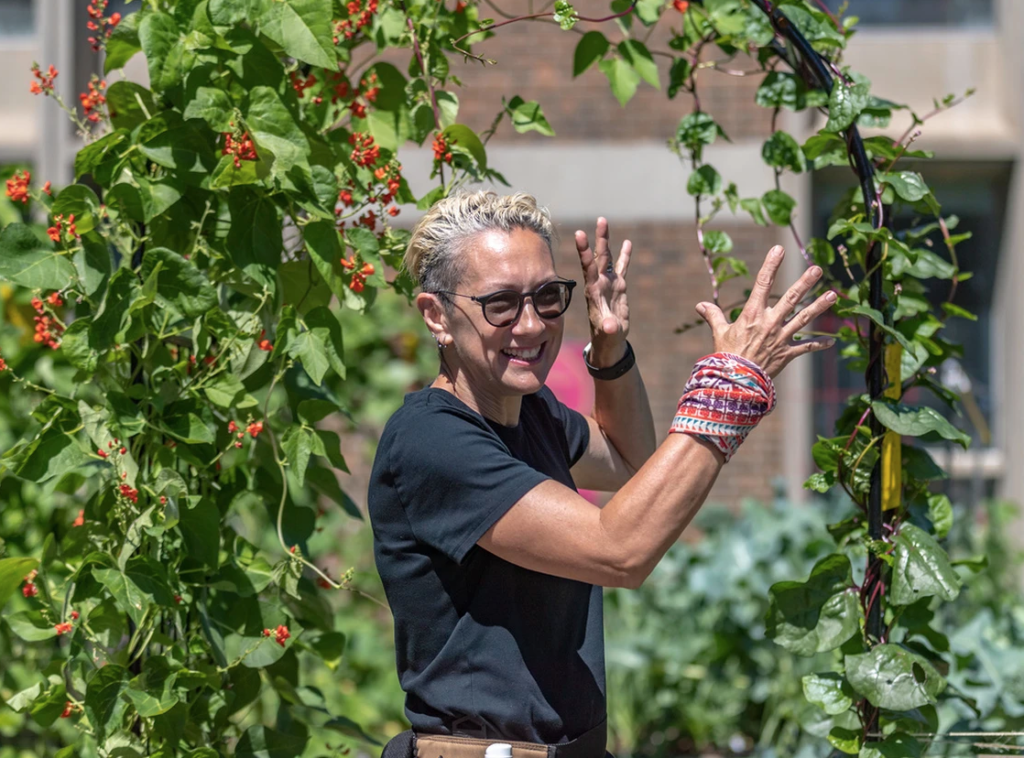
mind.heart.mouth intergenerational garden
Today, kids are aware of the global threats to the environment—but their physical contact,
their intimacy with nature, is fading.
—Richard Louv. Last Child in the Woods. P. 1.
How the young respond to nature, how they raise their own children will shape the
configurations and conditions of our cities, homes—our daily lives.
—Richard Louv. Last Child in the Woods. P. 3.
The first group arrives at 12:30.
Finding my child-friendly outdoor voice, I ask them to sit on the grass around the
three “Little Acres”—polypropylene garden beds—I have acquired specifically for this
event.
Twelve heads between the ages of five and eight, turn to me with a “You must be
kidding” kind of look.
“I am allergic to roses,” says one of the heads.
“Okay. That shouldn’t be a problem,” I say, puzzled by their reactions.
A child lowers into a squat, looking around themselves, seemingly searching for
something in the green grass.
Still standing, others also seem to be searching, their worried eyes inspecting the
ground.
I suddenly understand and smile.
“It’s pretty safe, I say. There might be some bugs, but nothing that could hurt
you really. If you like, you can come sit on the ground on this side, where there is
no grass.”
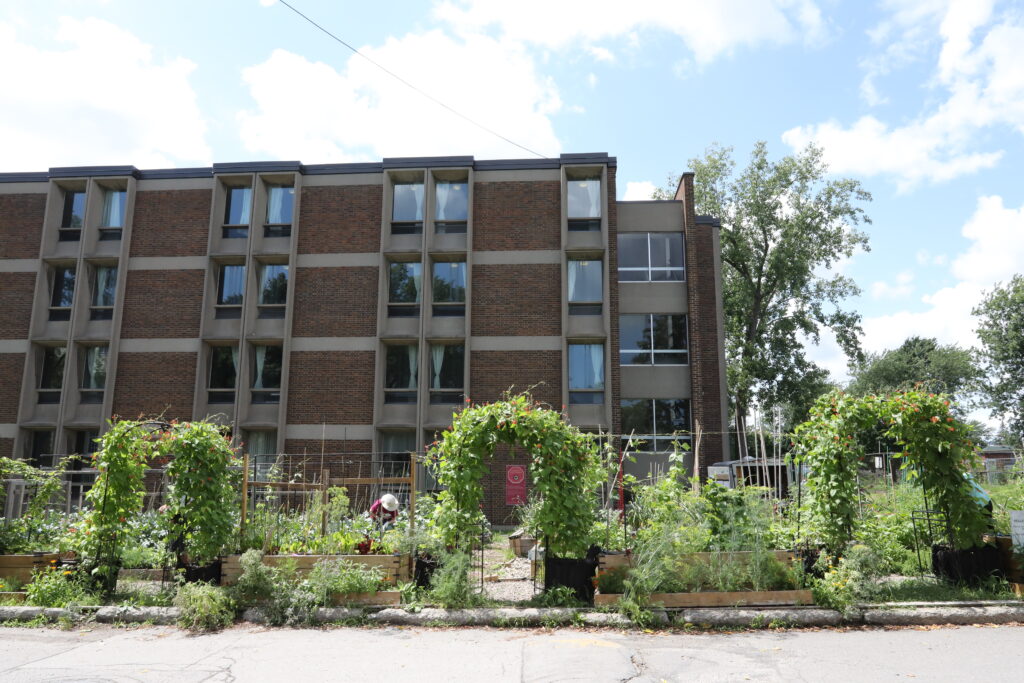
Leading the way, the camp counselors sit on the grass and encourage the campers to do the same.
With worried faces, the young bodies lower to the ground, looking at one another, exchanging apprehensive glances.
Mindful of short attention spans, I simply tell them that I created this garden so that people who don’t have enough food and/or who don’t have the space to make a garden could come here to grow vegetables. Everybody who volunteers in the garden for as little as one hour a week can share in the harvest.
“So … there are different kinds of gardens, and today, we are going to talk about how to make a garden like this one using what is called raised beds.
Here, I built the garden beds out of wood, but they could be made of anything really. The ones I got for this activity are made of a slow biodegradable polypropylene.
Once you have chosen your containers, you fill them with soil.
I already put most of the soil in these, but I invite you guys to come and touch it
to see how it feels. Did any of you ever grow a garden?”
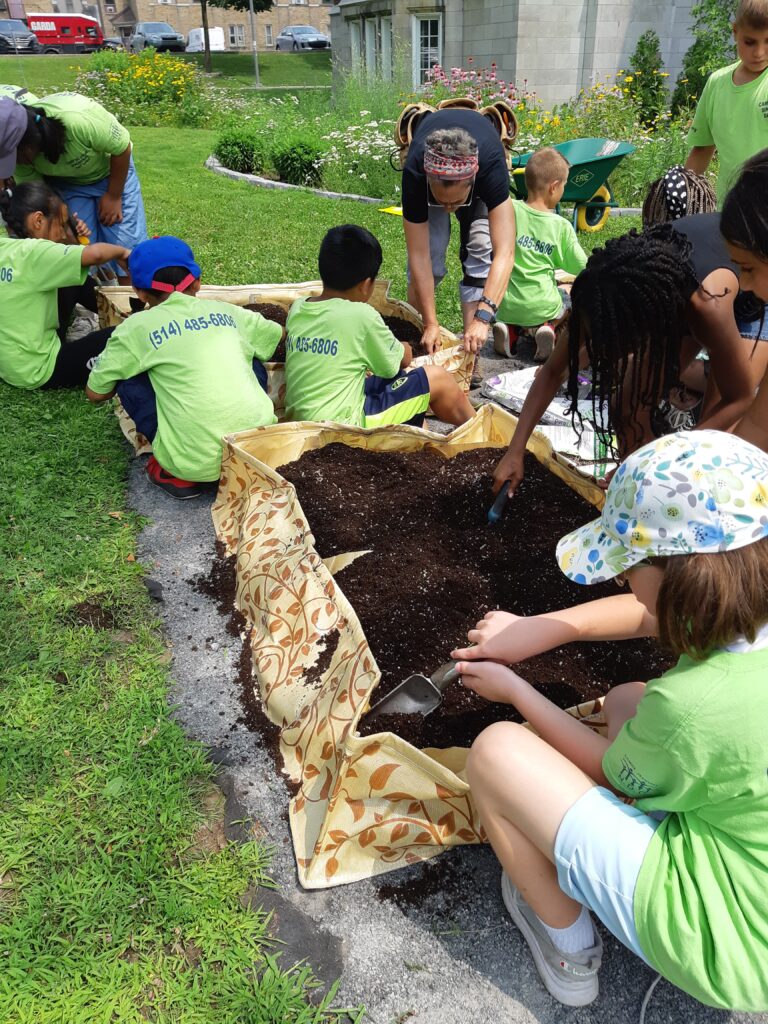
Blank stares.
A hesitant hand reaches in.
Smiling, I ask: “What do you think? How does it feel?”
“Soft,” smiles the child.
“Yes. It’s soft, I chime in.”
Hesitantly, more hands reach in. Some barely tickling the surface of the soil. Feeling it like it’s a delicate matter that could break, or worse, jump at you, if you used too much force. Other hands sink in, wiggling, searching fingers, producing puzzled, yet intensely focused gazes.
“Another thing we need to do to make a vegetable garden is to add plant food
to the soil. Compost, for example, helps the vegetables grow well and healthy.
Among my favourites are vermicompost and chicken manure. Which are
basically worm poo and chicken poo.”
As I talk, I scoop up each of the substances for all to see. Sure enough, expressions of disgust fill the air.
“Ewe.”
“That’s disgusting!”
“That’s gross!”
“Can we use dog poo?”
I reassure them that this is different from human or dog or cat poo, which we would not use in a vegetable garden, and that it is quite sanitary for us to mix in the soil to feed our garden plants and that, of course, we should wash our hands after. I explain that the plants only “eat” the minerals and nutrients they find in these composts.
That once it is processed, we are not actually eating poo when we eat the vegetables.
I invite the children to take trowels to add compost to the garden soil. First with repugnance, some small arms, equipped with metal tools, begin to scoop up the compost and pour it in the dirt. Then, giggles erupt, and a poo song resounds. Soon, in each of the beds, mixed by hand or shovel, a healthy soil concoction is coming together.
“It is important to mix the soil and the compost well. My preferred way is to use
my hands to massage all of this into a well-mixed matter. If you prefer, it is
absolutely fine to use the small shovels.”
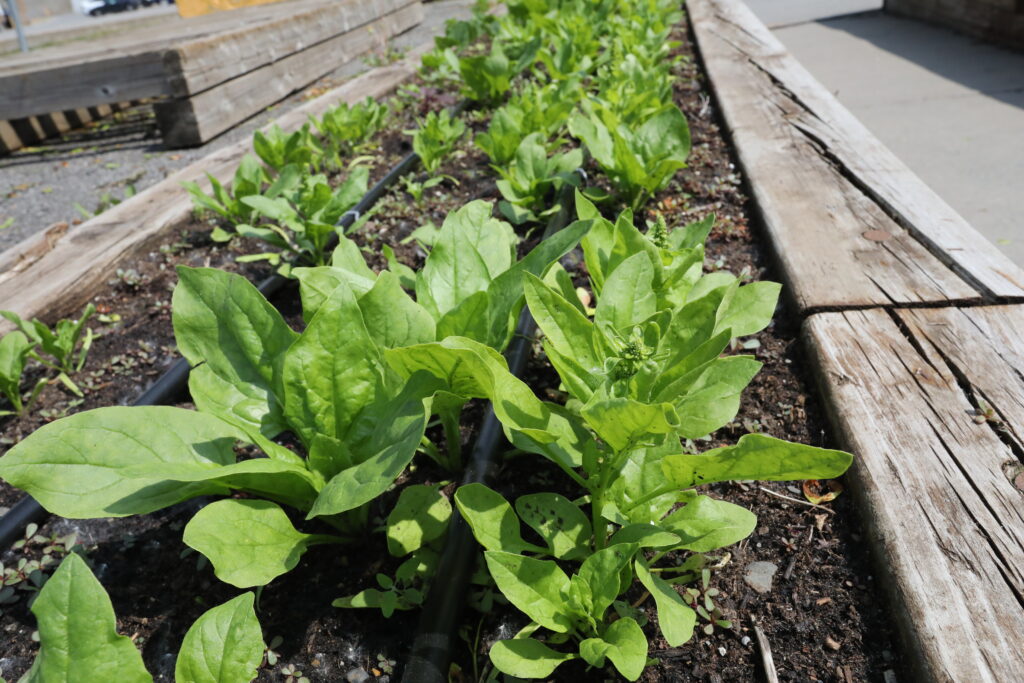
As a final step, I ask the children to choose a seedling that they can plant in their garden beds in a spot of their choosing. After careful selection, each child digs a hole and plants their seedling. Some take a moment to consider the best spot, others seem to just dive in. While teaching how to proceed, I notice that a few children are still busy shovelling compost or massaging the soil.
I breathe a sigh of relief. Maybe not all is lost; it seems children can still happily get dirty.
I repeat this experience with two more groups that day.
The second group was composed of slightly older children (8-11) and the third group of tweens (11-13).
The older they were, the more reluctant these young people were to sit on the grass and to touch the dirt.
That day, I was reminded of the reasons why I was engaged in this work, which had led to the creation of the garden and selection of the name mind.heart.mouth. Yet, I was surprised to see the young age at which this disconnect begins.
With more than 80% of the Québec population living in urban areas, we are currently looking at generations of individuals who have had little to no contact with farming and to the way their food grows, little knowledge about what goes into the food they consume every day, and little understanding, or care, about whether the few
companies that control the world’s food systems are concerned about anything but the profits they make year after year. In the garden, many people of all ages have never seen how vegetables grow, and don’t know how they end up in grocery stores or even farmers’ markets. The lack of attention to these dynamics causes grave impediments on every level of our world. 1
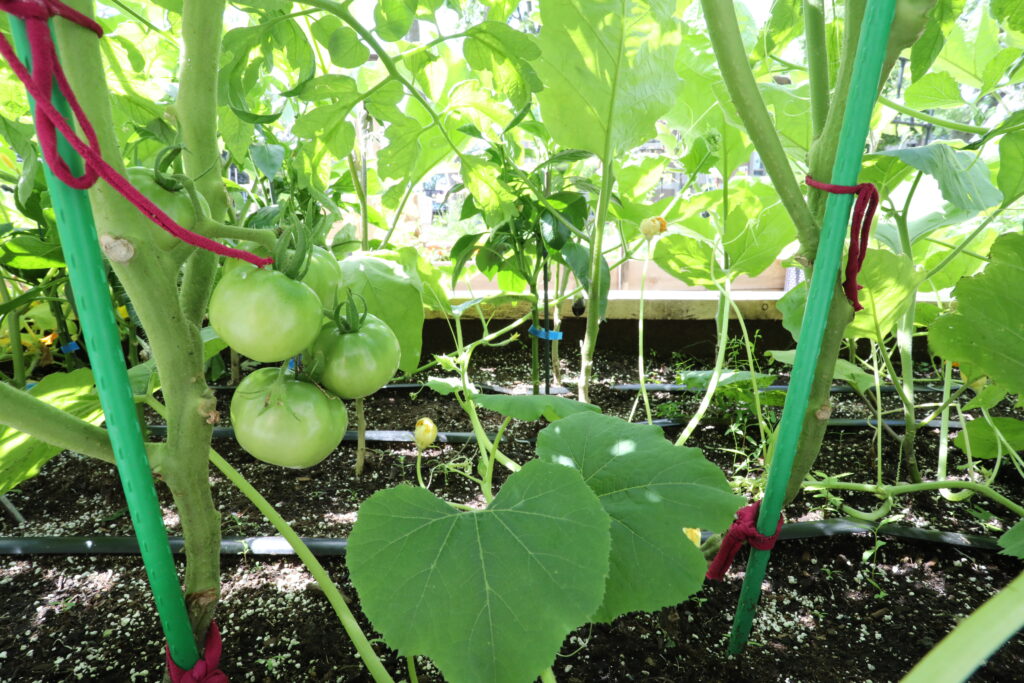
“How long before we eat a tomato after we plant the seed?”
“About 4 to 6 months.”
Jaws drop. Eyebrows frown. Eyes fill with disbelief.
That’s a lifetime for today’s brain that understands time in terms of Internet search and the ability to reach someone—everyone—within seconds. Our planet’s natural systems operate in their own timeframes. How can we help children develop intimate caring relationships with nature and with the planet, so they are not repulsed or scared by the ground they walk on, the soil in which our food grows, the compost used to grow organic food, and the more than human creatures that live in them?
As our mind observe a temporality powerfully demonstrated by planting a seed in the soil, watching it germinate over days and sometimes weeks, by witnessing the growth of a plant over weeks that turn into months before the leaves can be harvested, and even longer before fruits and vegetables have ripened, our heart grows fonder from the realizations and care provided to the growing food, and the reciprocal energy that nature invests in providing food for our mouth. There is a simplicity—a humility—that surfaces in a garden, in being forced to surrender, to be grateful for Earth’s generosity and sustaining gifts.
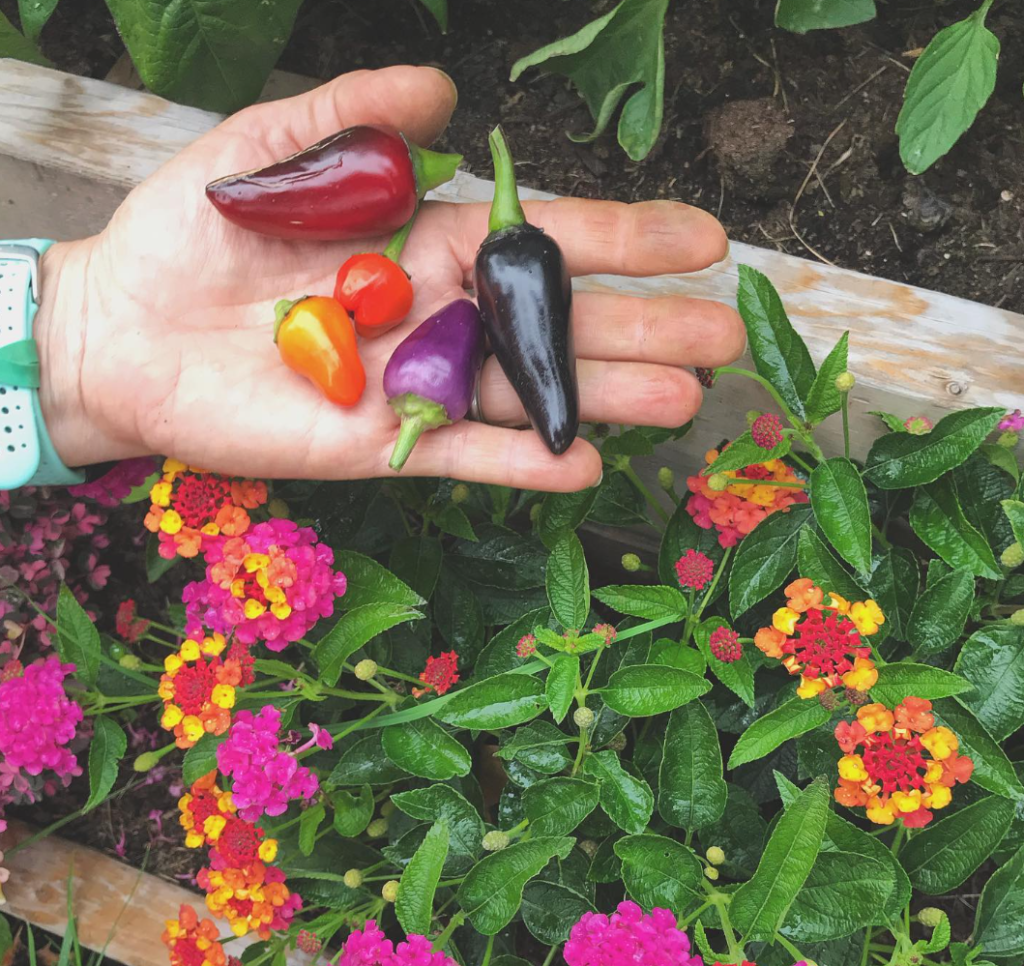
The name mind.heart.mouth stands for the opportunities offered in a nature-based participatory community project as we discover and experience essential connections with our planet. For our mind and our heart to meet and breathe in rhythm with the planet as they encounter the temporality held in the materiality of growing food with planet Earth.
Follow mind.heart.mouth on Instagram!
1 Alison Blay-Palmer. “Power Imbalances, Food Insecurity and Children’s Rights in Canada. Frontiers in Public Health.
Frontiers Media SA., 11 Aug. 2016.
Top 5 Podcasts to Check Out!

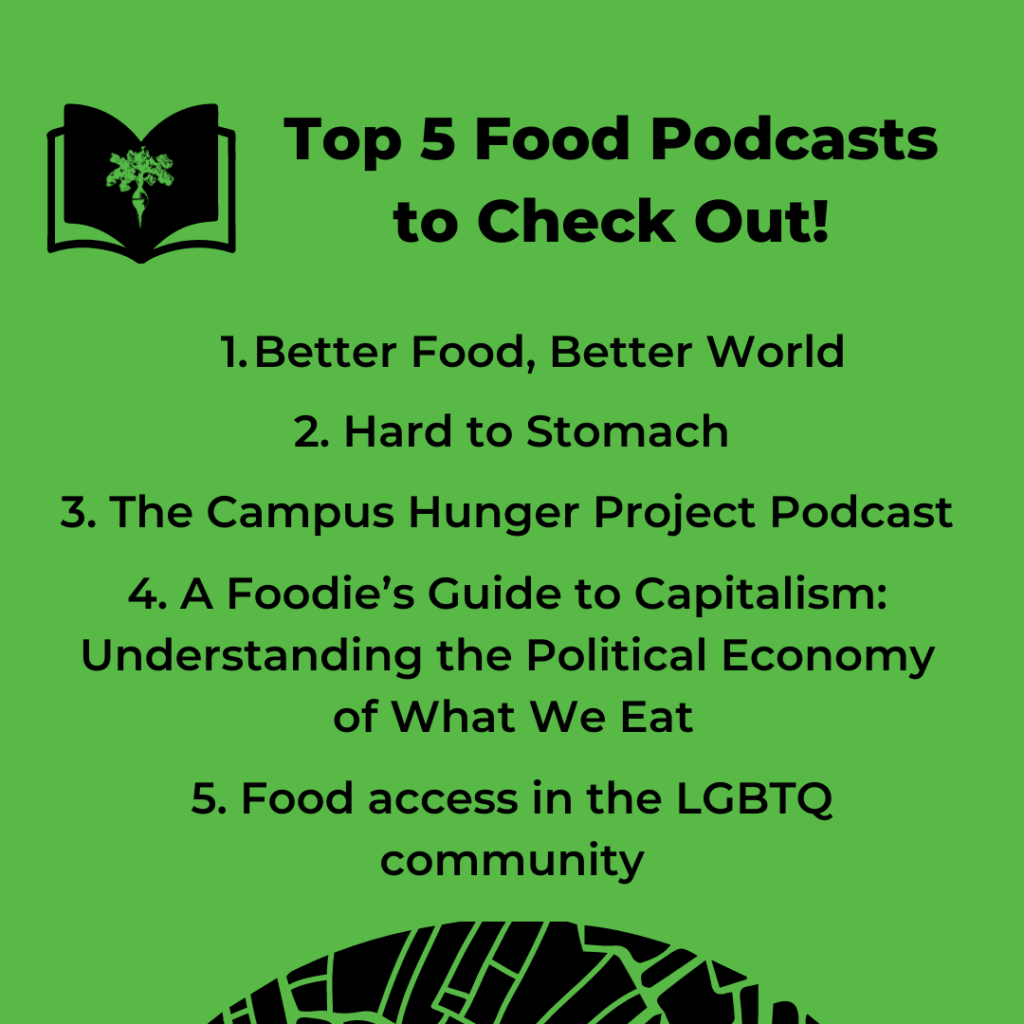
We have a new monthly feature!
TOP 5 Titles to check out with themes of agriculture, food access, coops and food communities.
This month we are featuring our Top 5 Food Justice podcasts.
Looking for a good listen? Check out one of these inspiring podcasts!
- Better Food, Better World
- Hard to Stomach
- The Campus Hunger Project Podcast
- A Foodie’s Guide to Capitalism: Understanding the Political Economy of What We Eat
- Food access in the LGBTQ community
Have a suggestion for a book, podcast, documentary etc? Let us know!
Top 5 Books to Check Out!

Our team will offer a new monthly feature – TOP 5 Titles to check out with themes of agriculture, food access, coops and food communities.
This month we are featuring our Top 5 Books on Indigenous agriculture and food systems.
Looking for a good read? Check out one of these inspiring books or articles.
2. A Land Not Forgotten: Indigenous Food Security and Land-Based Practices in Northern Ontario
3. Indigenous Food Systems – Concepts, Cases, and Conversations
5. Making Food Systems Work for People of Color: Six Action Steps
Have a suggestion for a book, podcast, documentary etc? Let us know!
Queer Farming in Quebec: An interview with Le ferme cooperative aux champs qui chantent

Welcome to our latest blog, where we delve into the inspiring world of queer farming in Quebec, and celebrate the intersection of queer community and sustainable agriculture.
We met with co-founder of possibly the queerest farm in Quebec Le ferme cooperative aux champs qui chantent, Jenna Jacobs, to discuss the farm and the realities of modern day farming for the queer community.
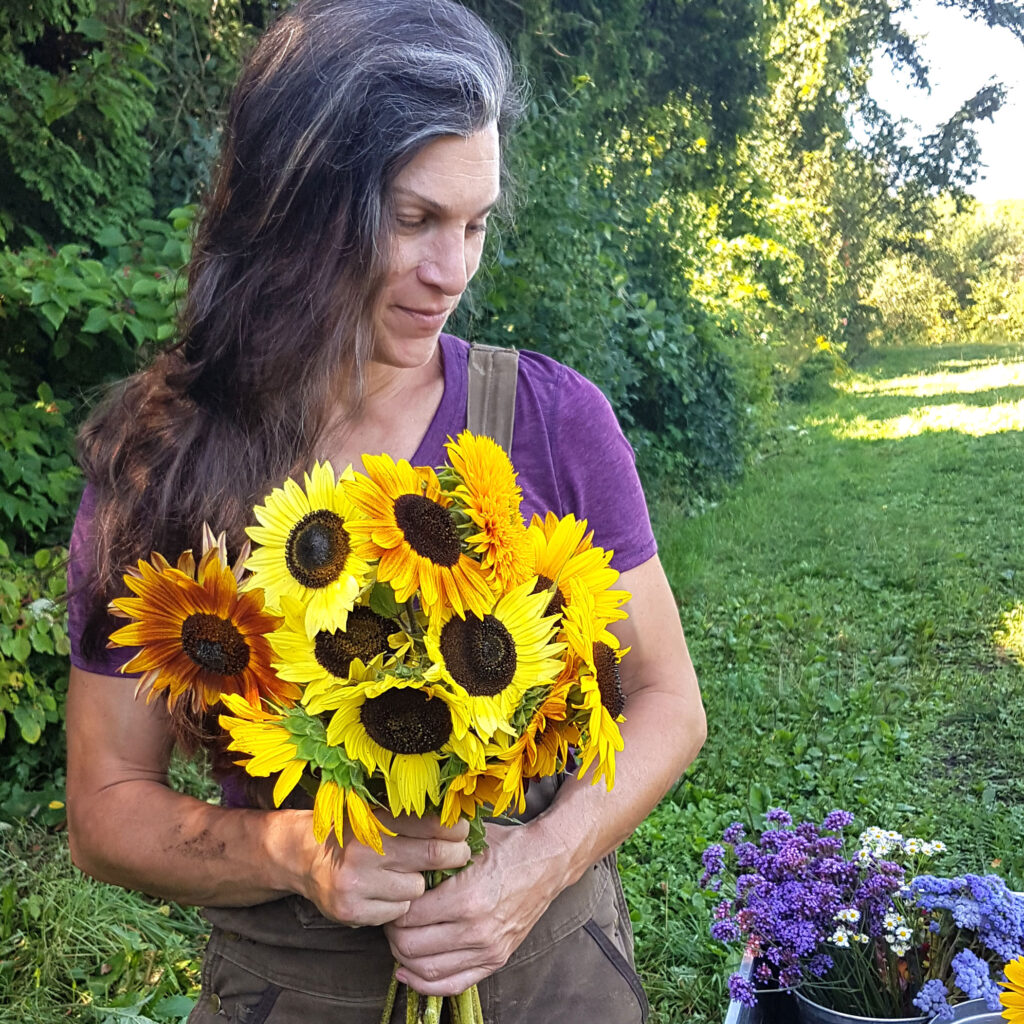
Jenna is a trans woman, mother of 2 kids and modern homesteader. She is a full time farmer and in her spare time works on her personal projects of raising her cows and sheep for meat and milk products like homemade yogurt and cheese. She also transforms fresh farm produce into preserves such as tomato sauces, salsa, pickles and BBQ sauce. Even though farm life can be challenging at times, Jenna has found her home in her queer farming family.
The farm is a worker-owned, worker-run cooperative, passionate about growing food and building community. This cooperative farm came from a dream of rural farm life between friends who wanted to grow food ecologically and live in a community setting.
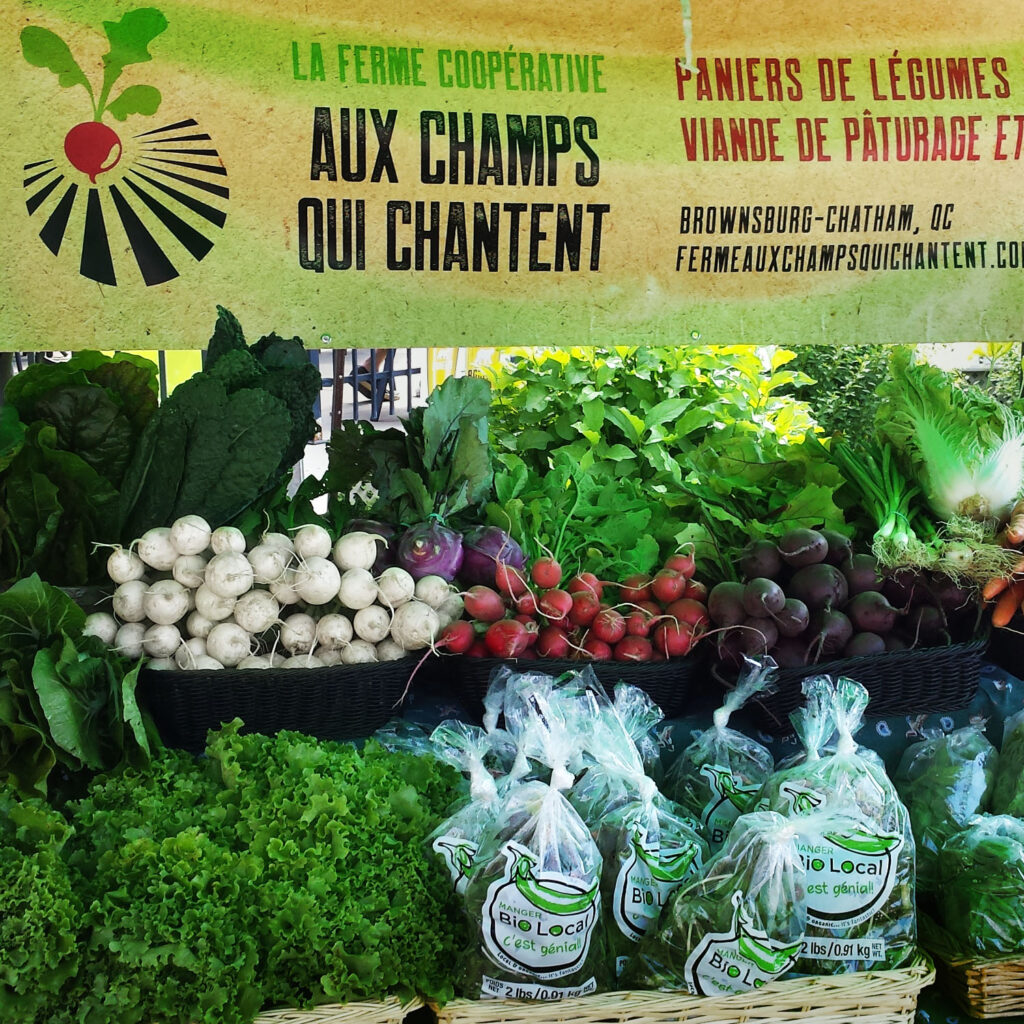
The team believes that a CSA basket program provides the maximum benefit for everyone, it’s effective for the farmers, reduces food waste and provides fresh season produce to a community that supports the farm. The CSA has four basket drop locations, including two in Montreal. You can still register for their vegetable baskets for this season.
In the first year the small team of three found farmland quickly, just outside of Montreal in Brownsburg-Chatham. They started their first CSA (community supported agriculture) vegetable baskets program and market stand the following year, offering 45 baskets the first year. Now in their twelfth year of providing CSA baskets they are currently offering 200-275 baskets each year.
What draws queer people to get involved in farming and sustainable farming?
“Because we provide a safe space for queers, queers are really attracted to come to our farm,” Jenna says, “there’s an inherent desire in a lot of queer people to get out of the city, live rurally, live sustainably, and be part of a project that is not so capitalistic as most city-run businesses are, and to have a link to the ground and work that feels really meaningful – like growing food for families. It feels like direct and meaningful work, and is its own kind of food activism.
We try hard to grow our food sustainably, reducing waste and we have a solidarity program where we ask folks to donate to a fund to redistribute to make fresh food more accessible to low income folks. Around $2000 has already been redistributed this year to people who need it.”
Are there more queer farmers in Montreal in 2023?
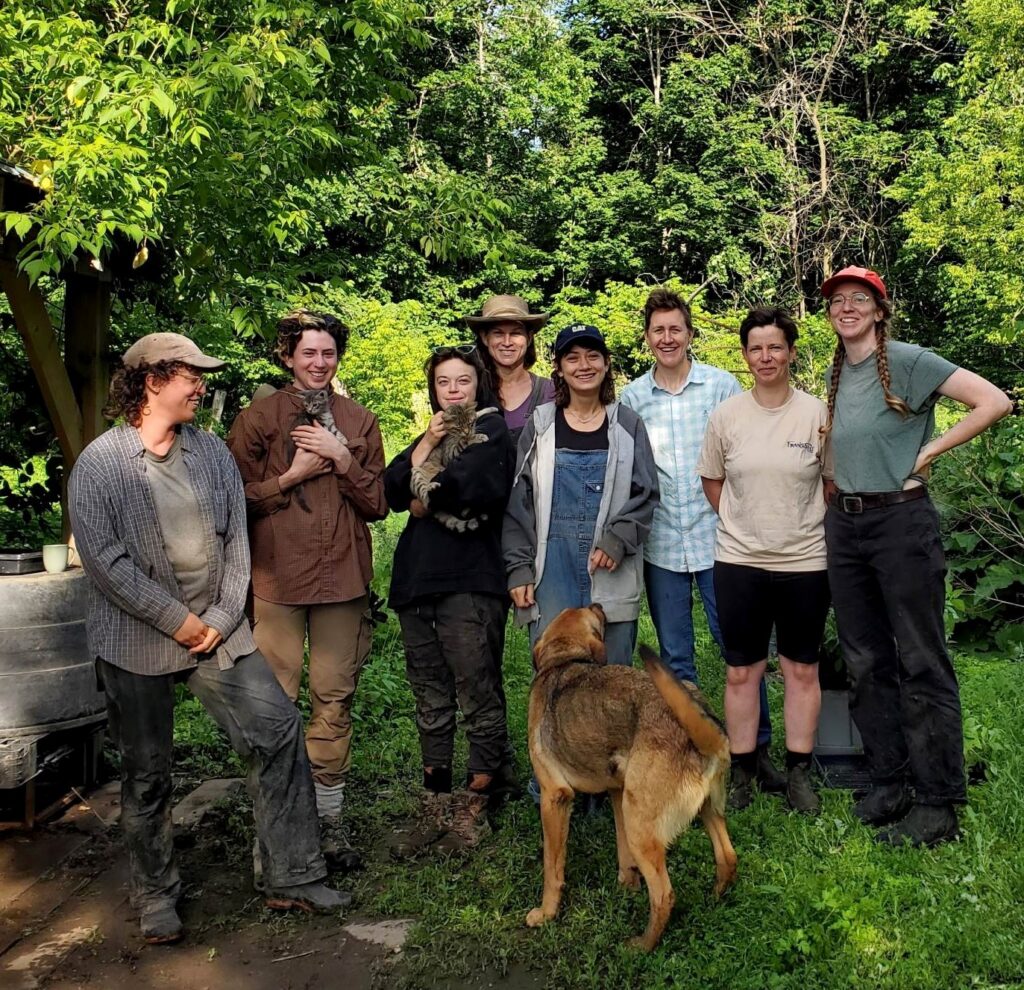
“At the start we were only three people, queer and / or trans women, and in 2015 we hired our first non-binary worker and it was at that point that queer folks started to be more attracted to the farm. So we started hiring more queer and trans people because they were applying for jobs and we thought this is awesome, we can provide safe work space for queer, trans, non-binary folks and women. Now this is part of our existence.”
The farm has a team of 3-5 coop members (who work 12-32 hours, 1-5 days a week) and 3 people who work 3 to 4 days a week. The cooperative believes in paying better to work less and offer a relatively competitive wage of $17 – $18 hourly.
They have created a work model to ensure weekends off to help foster a healthy work-life balance and are compassionate about mental and physical health needs of their team.
For queer folks in particular, finding a safe, open and accepting employer can be incredibly difficult. Plus, most farming jobs are in rural areas, making it challenging for folks to find a local queer community.
If you want to learn more about the farm and check it out, they have several events each year.
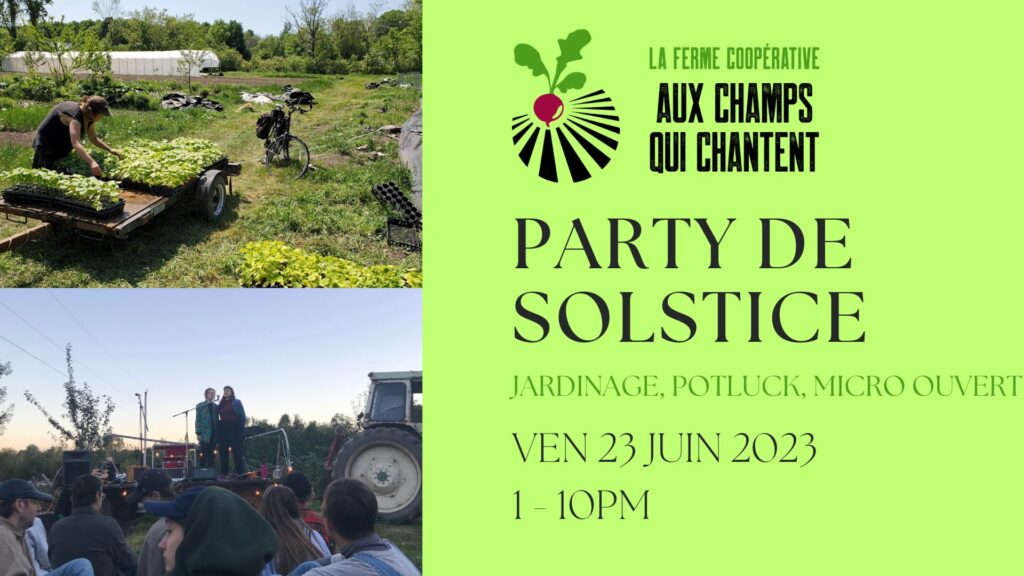
Coming up on June 23th for the Summer Solstice Party at the Farm with a hands-on gardening session, a potluck and an open mic night around the campfire.
There will also be a countryside summer concert coming up the last weekend of July featuring Rae Spoon, following a collective work day. This event is in partnership with Compagnons Maraichers·ères, who organize excursions to local farms every weekend.
The farm also hosts an annual Harvest party in September, which includes farm tours, hands-on activities, live music and a hearty harvest potluck dinner!
They also host a spring party for the subscribers of Bio Locaux, a project of the CAPÉ where a collective of farms distribute 1500 baskets of local organic food every 2 weeks from November to May.
You can learn more about getting involved at the farm here.
Happy Pride month to all our queer farming community!
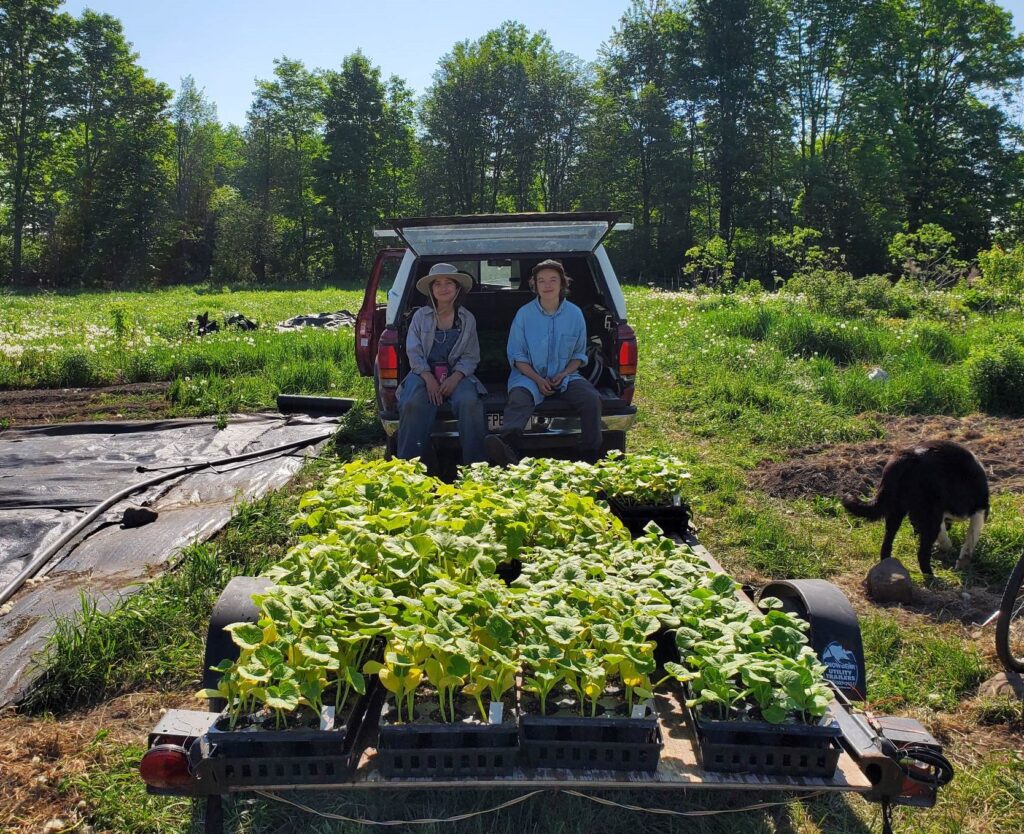
http://fermeauxchampsquichantent.com/the-farm/
CFC Achievements and Future Directions under Global Climate Change: An Interview with Professor Satoshi Ikeda

Who is Satoshi Ikeda?
I am Professor Satoshi Ikeda, recently retired tenured professor from the Department of Sociology and Anthropology, Concordia University, and one of the founding board members of Concordia Food Coalition. I have been involved in many ecological and food projects in Montreal and at Concordia as I am passionate about grassroots movements.
Why was the Concordia Food Coalition created?
The CFC was created ten years ago to fight against the existing food system at Concordia that was managed by Chartwells, a multinational corporation serving food for diverse clients including prisons, military, senior care facilities, and education institutions.
The quality of food was deplorable at Hingston Hall where students were forced to purchase expensive meal plans. Food venders on both SGW and Loyola campuses were controlled by the same problematic company, and the only choice of ready-to-eat meals for students was the industrial food that was unhealthy for humans with huge ecological costs such as land, water, and air pollution and greenhouse gas emissions.
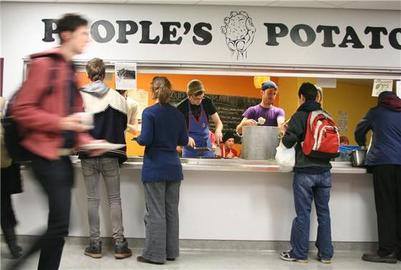
The People’s Potato was the only choice of healthy vegan food on campus, but they only were able to offer free meals only during lunch time. The primary objectives of CFC when it was founded was to challenge the corporate food monopoly on campus and offer healthy and affordable alternatives.
What are some examples of impacting food projects on campus?
In the following ten years CFC supported diverse initiatives, some successful and others not. The effort to compete against corporations for the new contract in 2014 failed because the Concordia administration eliminated the possibility of a bid by the CFC-organized consortium of Montreal meal providers.
One shining success during the early years of the CFC was Hive Café. This student-owned and student-run solidarity cooperative provides healthy meals and beverages while offering living-wage jobs to Concordia students. Shortly after, other food initiatives joined them and became the fixtures at Concordia that finally offered healthy food and knowledge about food production and access issues. Some of these projects include the Concordia Farmers Market and the Loyola Hive Free Lunch Program. Campus Potager was a project to produce organic food on SGW campus, and it provided vegetables to Hive Café and in the market. Season Jars offered workshops to improve student food life such as fermentation, pickling, canning, and ethnic vegan cooking. These CFC student projects had achievements that made campus food life richer and healthier and left a positive impact on student life, even though some concluded.
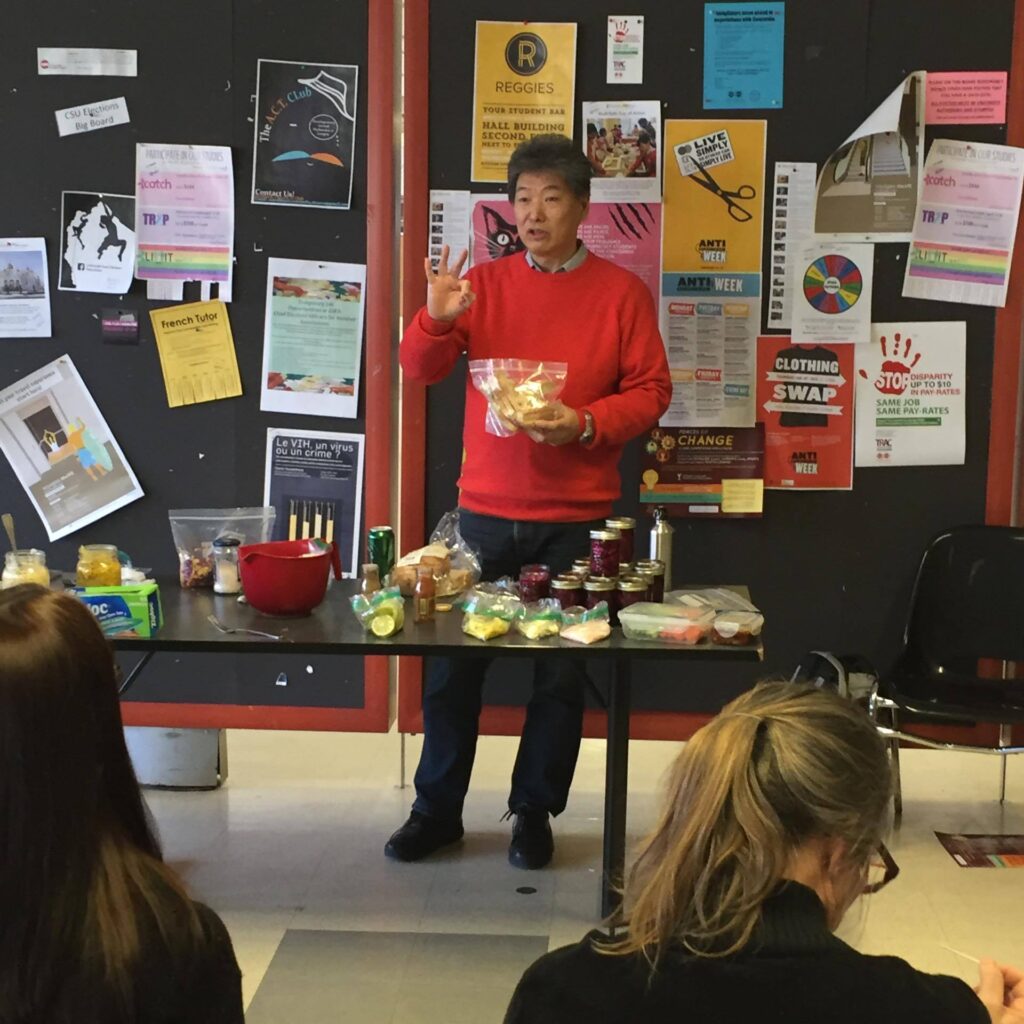
How can we envision the future of CFC?
The Concordia Food Coalition started as a promoter of food justice on campus against the corporate monopoly. Solidarity co-operatives that are community-owned and -operated with truly democratic governance are the answer to economic injustice in the capitalist system. Promoting free lunch programs and free food baskets challenges food insecurity and shares knowledge on healthy food and local food production has advanced food sovereignty.
How does the CFC relate to Global Climate Change and Food Access?
The CFC will continue to challenge corporate food monopoly and promote healthy and affordable alternatives. In addition, the CFC can lead the Concordia community to prepare for global climate change with diverse forms of disruptions and disasters.
Global climate change is a new layer of injustice against the people in the Global South and in Indigenous communities. This layer was added by colonialism, post-colonial economic injustice, exploitation under neoliberal globalization, and oppression against the people of color, Indigenous peoples, and marginalized and excluded people with no or low income.
We already see massive climate refugees from the Global South seeking survival in the Global North. There will be more violent weather events like ice storms, snowstorms, hurricanes, tornados, floods, drought, locust epidemics, unseasonal frost, and hailstorms. Strong winds will rip off topsoil and devastate farming infrastructure. These events will cause food shortage and inflation, and eventual famine if people depend on industrial farming and mass-produced food.
What are your hopes for the future of the Concordia Food Coalition and the Montreal food network?

The viable strategy is to promote local-organic food production with farmers cooperatives like Ferme Coopérative Tourne-Sol and Coop les Jardins de la Résistance. Hyper-local urban farming co-operative like Coop CultivAction also shows a possible direction and proof of concept for campus auto-production that is educational.
It is necessary to grow more food in the city to improve food autonomy. These actions are both mitigating (reduce carbon emission by rejecting industrial farming and long distant transportation) and adapting (prepare for climate disasters). By refusing industrial food controlled by the corporations, these actions are in solidarity with the food justice and sovereignty movement in the Global South and in the Indigenous communities. Learning from pre-industrial and Indigenous food ways gives inspiration for food possibilities like polyculture and food forests.
It is my hope that CFC supports and promotes initiatives that help the community survive and thrive under global climate crises.
June 2023
Campus Community Conundrum

How can we build and support healthy, equitable (and joyous!) student communities if we don’t consider food as the focal point?
To feel that you’re a part of something is a good feeling.
It makes us feel seen, it helps us see others, and it helps build opportunities for spontaneous relevant learning. However, that feeling rarely occurs without some intentional frameworks.
As a college professor, I’ve watched for too many years, students suffer from loneliness, poor nutrition and sleep deprivation and have felt frustrated because there has been little that I could do to help. When I returned to teaching after some time away to cope with a cancer diagnosis, this frustration turned to anger. I no longer saw students as people who passed through this relatively short stint at school and who would get back to their regular healthy habits after they graduated. Instead, I saw them as people about to step into the culture of busyness that characterizes so many adult lives and leaves little time to care for themselves, which I imagined as a Dr. Seuss-style machine that I had just been spat out of, full of learning through trauma. I wanted to run back to the beginning, stand at the entrance to that machine and hand out some tools that might help them as they pass through it.

The outcome of this wish has been the Communal Lunch Project, a research project funded by NSERC, through George Brown College, that examines the potential for communal food programming on campuses.
This research has dovetailed with the sudden and heightened awareness to the problem because of the pandemic and a shift in attention to the connection between food and student well-being. It is well-established that physical and mental well-being are supported by a healthy diet and strong community ties. It is also understood that the postsecondary years represent an important transition period – a time when young adults adopt behaviours that can influence their health and well-being now and in their future.
Our research asks if communal food programming can exist on campuses, and can it help students access nourishing food, develop food literacy, and build social connections. Our research also asks what frameworks are required and what institutional commitments are needed to build them.
It’s also important to pay attention to these young adult years because, as elucidated in a NY Times special section on mental health (see link below) the mental health problems that young adults are experiencing reflect the problems in our culture.
“We can’t divorce our psychological state from the forces that dictate our lives.”
Before the pandemic, almost half of post-secondary students reported that they sacrifice buying healthy food to pay for school and other necessities (Meal Exchange Report, 2016), while 58.8% of students reported feeling isolated or very lonely (NCHA-II report, 2019). As a result of the pandemic, students have seen their cost-of-living increase and have experienced and continue to experience isolation to compound already difficult circumstances. We must ask ourselves: what are we doing to our students? This is a cultural crisis. And our current campus food culture, which is an outcome of systemic constraints such as commodified eating spaces that don’t nurture healthy eating practices and schedules that don’t allow enough time for eating, reinforces a destructive culture, every meal of every day. We must examine the potential for a new campus culture that emphasizes collective engagement in food practices over individualism and consumerism.
An intentional cultural shift can also create what sociologist, Ray Oldenburg, called “third places,” which are “places where people spend time between home and work [or classrooms], where we exchange ideas, have a good time, and build relationships,” which he considered important for a community’s social vitality.
These responses to our virtual and in-person communal food programming illustrate the power of “third places” to support students:
“The cook-along was wonderful, thank you! I learned new ways to connect with food and prepare meals…Who knew turnips and a potato-based meal could be so delicious!”
- – George Brown College student, 2021
“Loved it! Gave me something fun, healthy, and affordable to do in a stressful exam time.”
- – Dalhousie student, 2021
“You feel like you’re part of something.”
- – Education Co-ordinator, Concordia Food Coalition, 2022
These are phrases students living in residence used to describe their experience participating in a community kitchen initiative we launched this year, called Sundays in Residence:
“Loved hanging out!” “I learned something.” “The food was delicious.” “We laughed a lot.” “We had to work hard.”
There’s an energy in these quotes that tells us about the impact that cooking with others has on one’s sense of belonging and the opportunities for joy and relevant learning that it creates, which we know contribute to well-being.
I want to reflect on the last phrase: “we had to work hard.” Building and maintaining frameworks for a new campus food culture requires work: hard work, messy work, collective work! Sadly, by prioritizing convenience in campus food systems, we have created individualized, sanitized, and wasteful food environments. We have omitted the most important part of eating: the shared work involved in getting food to a table – this is what ultimately connects us! It requires a type of work that we’re not used to engaging in on campus, but this type of work works. Food-making activities have the power to engage and make us feel like we’re part of something, which builds those valuable temporary communities or “third places.”
It’s important to remember that students are part of and will join workplaces and communities where they will decide how time, space, and resources are used. Considering this, we really want to think about the habits our institutions encourage; every moment, in and outside of class is a learning moment – and campus food culture is an integral part of this learning. A shift that makes room for innovative approaches to scheduling, use of resources, and communal eating practices can lead to healthier campus communities. In an article that examines how food has been a focal point of social justice activism over the centuries, Ligaya Mishan writes:
“Nourishment is a prerequisite to equity.”
If we acknowledge that equity is at the heart of healthy communities, then we must examine more closely how all students eat their way through their days at school.
May 2023
The Case for Food Coops on Campus
The value of food coops goes beyond the balance sheet
Author: Shylah Wolfe of Concordia Food Coalition
This past March 22nd marked eleven years since 20,0 000 students congregated in Place Jacques-Cartier to demand a new vision for education and student rights. The movement grew so strong it ultimately brought the Quebec government to its knees. While the obvious benefits of that hard won battle seem easy to take for granted now, the less obvious legacy of the Maple Spring is how these students built a social movement that taught a generation about care, community and democratic economies. Off the heels of the Occupy Movement, and initially not being taken seriously by political leaders, the student body quickly saw that flaws in the establishment would require years of repair. Red square organizers discovered their collective power to disrupt and democratize the economy, and used it to institutionalize solidarity and self determination on campuses across the country.
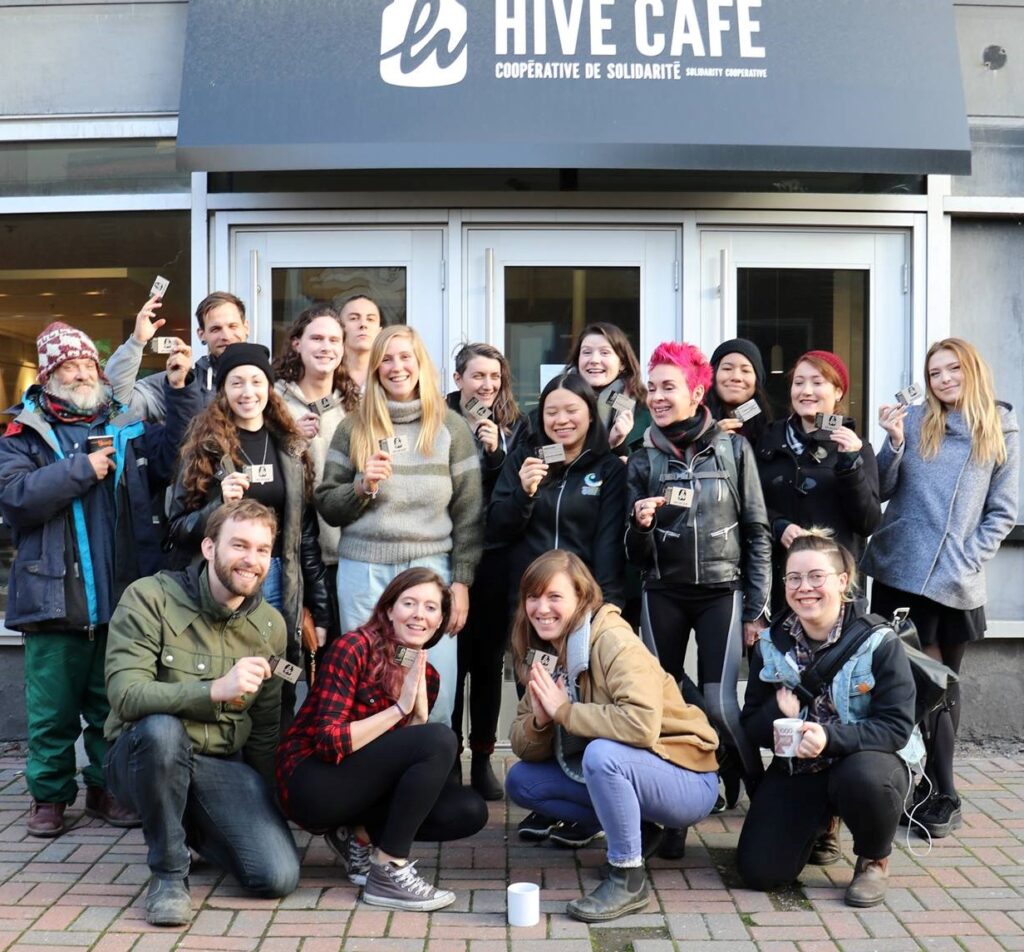
Quebec is a bastion of the social economy. At Concordia, the history of cooperative organizing actually stretches back to the 1960s but was reinvigorated with the wave of student leaders that came to office in 2013. They targeted food services because the administration and private companies had consistently failed to meet the needs of students for decades. They held referendums to address solutions. The student body voted for cooperatives like the Hive and Reggie’s because they underscored the right of students to democratically control their own spaces and meet their common needs. Unlike corporations like Java U or Aramark, the Hive and Reggie’s are beholden to their members who own them and use them, not faceless shareholders living far away. What these businesses do, what they sell and the money they earn belongs to the students and community of nearly 10 000 members. So, they offer lowish prices, good quality food and drinks and free-to-low-cost space to student groups, as well as generally great vibes and a sense of community.
Recently though, the student-run co-op model may be falling out of favour. Some critics have been raising the alarm, saying that coops are inherently financially unviable, that they are a drain on the student coffers and time. Suggesting preference for an “easier” route for providing services to students, critics argue that these businesses would be safer and more reliable in the hands of private enterprise. Could these nay-sayers be right? Let’s be real, our campus food co-ops have not been celebrating yearly surpluses, and yeah it’s true cooperatives rely on more time and effort, from the people they serve, to run properly, than private business does.
But to dismiss the model on these premises is a grave mistake because it overlooks the realities of business and contradicts the mission of a social purpose organization:
First, it is vital to remember that financial struggle is not limited to cooperative enterprises. Nearly 80% of all food service businesses in Montréal close in the first 5 years. With boom-era profit margins at 2.6% at best, the struggle is real, no matter what the ownership structure. Concordia has seen this struggle not too long ago: the CSU-owned food corporations (that previously occupied the Reggie’s and the Hive locations) closed with debts over a million dollars. Debts that the CSU had to cover.
In contrast, cooperatives are twice as likely to survive 10 years of operation than conventional Quebec businesses. They tend to be more risk averse, adaptable, stable and resilient in crisis times and actually more likely to emerge as a result of crises, to meet needs failed by the private and public sectors.
COVID shutdowns, staffing shortages and skyrocketing inflation have crippled the restaurant industry indiscriminately. By September 2022 the entire Canadian restaurant sector shrunk 43%. In Québec specifically we lost almost 1000 restaurants since the pandemic began. Regular folks are just spending less on food and drinks outside the home than they did before March 2020. Even Aramark, the major food service provider on campus, negotiated with Concordia to reduce the financial losses they experienced. Keep in mind that Aramark has estimated guaranteed revenues as high as $6 million annually, thanks in large part to the captive Residence Meal Plan market. Along with these same challenges, our Concordia coops faced additional hurdles to COVID-19, due to Concordia’s very tight shutdown policies, restricting any possibility of creating alternative revenue streams (like take-out).
Importantly, some students might not realize that these coops are [TO WIT] the only student services on campus that do not have guaranteed annual revenues like Aramark or other food groups on campus. Although that’s normal for most businesses to survive on the sales they earn, Reggie’s and the Hive are the only two providers in the Concordia ecosystem actually doing so.
Expecting Reggie’s or the Hive to provide the same quality of service and experience the same stability as any other campus food group ignores the unique challenges they face that others don’t. Expecting the same or better from these cooperatives is effectively holding them to a higher standard than every other group, which seems illogical at best and unfair at worst.
Secondly, co-ops bring value to students that is not limited to their financial success – value which private corporations are unable or literally disincentivized to provide.
The previous iteration of Reggie’s (owned by CUSA-Corps) and the Java U formerly had no incentive or obligation to offer students anything which did not bring in a dollar. They had license to set any prices they wished for food. Any jurisdiction over the student right to use these spaces was negotiated through the Union privately, rather than at a public meeting of members.
The only lasting, meaningful impact these past iterations have had on student services has been the million dollar debt that students paid.
Coops on the other hand, are fundamentally required to be centred on, owned by and democratically controlled by the people who use them. Because they are centred on people, they prioritize that community of members before profit. Because they are owned and run by their members they serve to teach and train the members (in this case students) how to run them. In the last eight years these food coops have had hundreds of students learning entrepreneurship hands on by building and running the organizations (as directors, workers, zealous user members), and thousands more have been learning how to use their voices in democratic enterprise. They’ve been teaching students through praxis how to collaboratively learn and prime them for business, service, solidarity and community self determination. The costs of this education are pennies on the dollar compared to an MBA or Masters in Community Economic Development.
Lastly, the past 50 years of history in the student food movement at Concordia shows that every win for students and student services has involved some element of acquisition of physical space, autonomously and democratically run by students.
The student food movement as we know it, started two decades ago, led by Q-PIRG, le Frigo Vert and the People’s Potato, was able to make their greatest strides by securing space on campus to produce and transform food. These hard-won battles required the support and ownership from the community, and as result the successful projects became community-owned social purpose organizations. If the Hive and Reggie’s were privately owned businesses, they would not be in the hands of the student body. This movement has also definitively set the tone and standard for environmental sustainability and food system justice at Concordia. Student leaders have time and again modeled a mission to transform food services towards equity, justice and food sovereignty. In the last decade, food cooperatives have played a pivotal role to further that mission and act as keystones in the vibrant campus food network.
The tension between providing affordable, high quality food while simultaneously providing liveable wages to workers is palpable in this capitalist hellscape, yet these coops have persisted despite myriad struggles to play a pivotal role in , served thousands of litres of fair trade coffee and cheap beer and reinforced the fabric of the campus food system we take for granted today. Without them, we may be a decade behind where we are now.
To support Reggies fundraising campaign go to www.renewreggies.ca and come to the Revive party on March 28th.
April 2023
Food Waste on Concordia Campus and the New Community Fridge
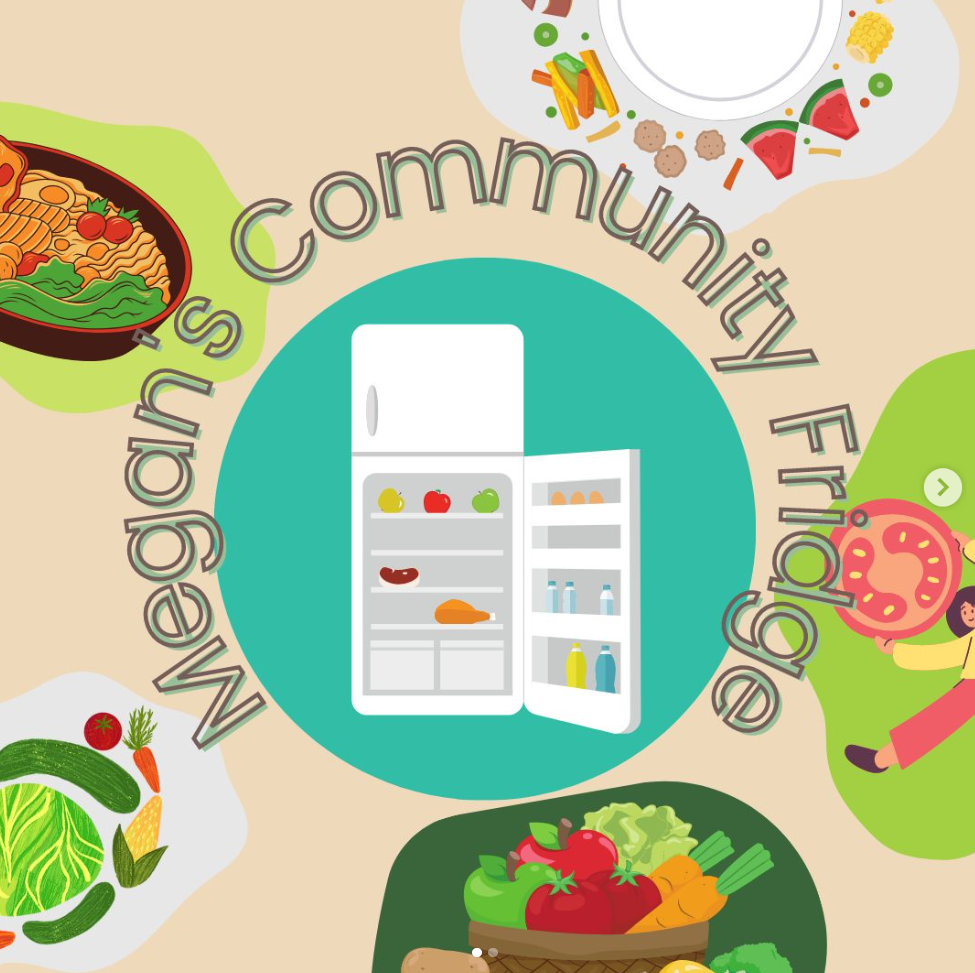
Food Waste On the Rise
Author: Maggie Morrison, Food Systems Education, Concordia Food Coalition
Food waste is the third largest greenhouse gas emitter in the world according to the UN FAO, and many of us involved in the sustainable food movement have been working hard to change that.
But did you know that food waste actually rose during the pandemic?
A 2020 study by Dalhousie University found that 55.4% of people believed they were wasting less food while cooking at home during the shutdown, but in fact their own food waste had increased by 13.5%. Meanwhile, waste reduction on Concordia campus has improved over the past few years. According to Concordia’s Sustainability Action Plan on Food and Waste report, in 2022, 40% of waste production on campus was diverted from going to landfill, largely thanks to recycling, and reuse programs. Michael Di Grappa (VP Student Services) specifically credits the improvement to partnerships between students, Food Services and third-party vendors and claims Concordia directly supports the efforts of student groups, community-led food gardens and creation of green spaces on campus. We at the CFC agree that the Concordia community is a bastion of both grassroots and institutional waste reduction projects.
Evolving Solutions on Campus
Groups like Zero Waste Concordia and Enuf are actively reducing waste production and creating better habits on campus, through initiatives like ABCompost, the Concordia University Centre for Creative Reuse and the Dish Project, through waste audits and through educational campaigns on how to sort your waste, recycling and compost. Most of these important initiatives were created and championed by Concordia students before Concordia institutionalized them.
Food For the People
This semester, a new and exciting student-led project has launched at Concordia: a community fridge! The Hive Free Lunch and Enuf joined forces to give Concordians access to affordable (free!) food as well as redistribute food waste at the same time.
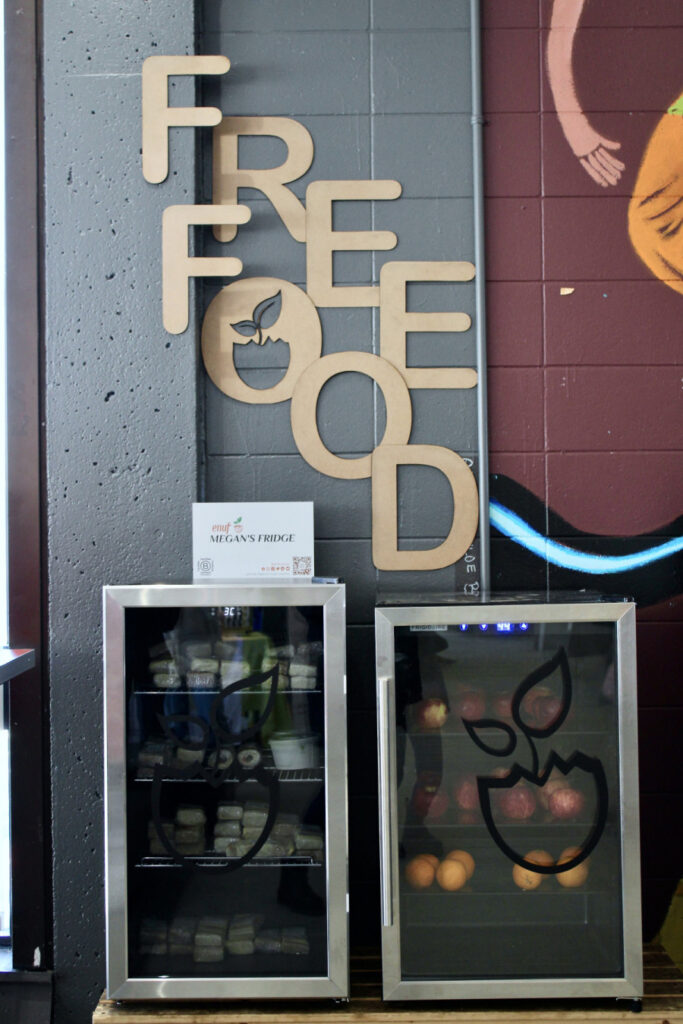
The fridge is located on Loyola campus, in the Hive Free Lunch space (SC-200) and is open and available for use Mondays to Fridays, 9:30 AM to 2:30 PM. There is space in the fridge for perishables and space beside the fridge for dry goods.
The fridge has been affectionately named “Megan’s fridge”, after a Concordia student who worked passionately to redistribute food waste on campus to food banks, through an initiative called “Food Cycle”.
To stock the fridge, Enuf uses their waste ambassadors to redistribute untouched and unopened surplus food from events on campus that would otherwise go to waste to stock the fridge.
The Hive Free Lunch program also takes care to stock the fridge when they have surplus meals from their lunch servings during the week.
Anyone is encouraged to stock the fridge, and anyone is encouraged to use it! The fridge provides free and accessible food, reduces food waste, and ultimately contributes to creating a sense of community for all.
Support of the Loyola fridge is crucial for the addition of more accessible community fridges in the future! Enuf is working to establish a community fridge on the downtown campus, which unlike the Loyola fridge, would be accessible to the public 24 hours a day.
Learn More About Campus Food Systems
Check out the Food Systems page on the CFC website to access more food resources, like the Emergency Food Guide. The CFC celebrates the progress of our community towards a waste-free future! Check out the Our Food System page on the CFC website to learn about the other waste diversion, reduction and education initiatives on campus. Send us a message to learn how you can start your own.
March 2023
Sources:
https://participation.concordia.ca/en/ideas/community-fridge-at-both-campuses
https://www.facebook.com/events/hive-free-lunch/megans-community-fridge-launch-byom/699139348459155/
https://thelinknewspaper.ca/article/new-community-fridge-opens-on-loyola-campus

